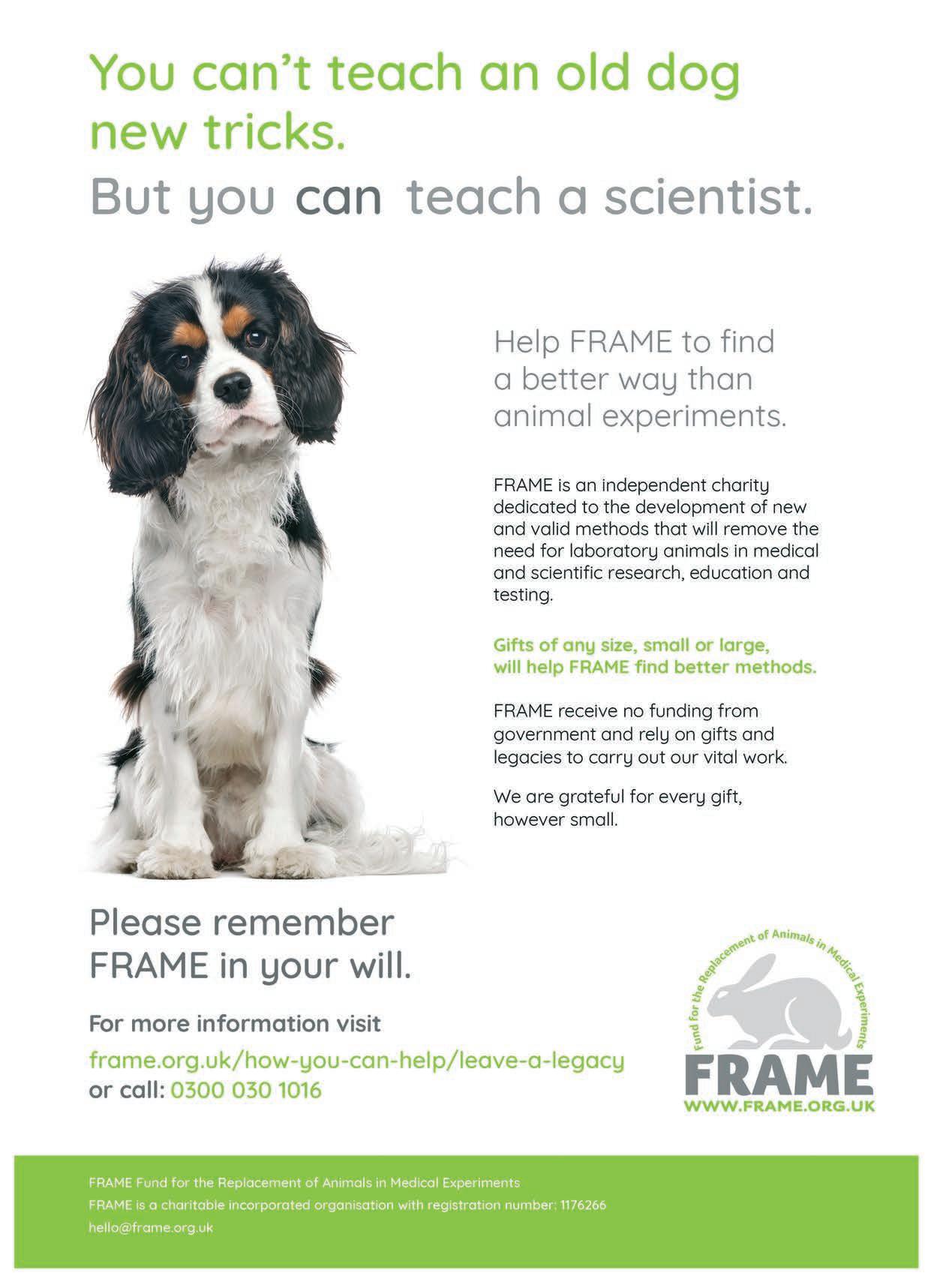








It’s always the case that at this time of year we are preoccupied with either looking back over the year or forward to the next. To an extent that is also true of this column, although in the current financial situation much of the looking ahead is directly informed by events of the recent past.
• A special podcast by the umbrella body Remember A Charity and the Excellence in Legacy Administration conference were both concerned with the effect of the cost-of-living crisis on legacy giving. The conclusion from both arenas was that the resilience of legacies to economic fluctuation may lead to the sector becoming even more crucial to the survival of charities.
• A particular aspect of economic policy that Remember A Charity also pointed to was the freeze on inheritance tax announced in the Chancellor’s Autumn Statement – a policy that may lead to charitable legacies becoming even more attractive because of their taxable status. Ill wind and all that!
• Charities have also had to adapt to the implementation of elements of the 2022 Charities Act – and that includes legacy managers. Their own professional body has provided some guidance on those

parts that particularly apply to the sector, including the application of the principal of Cy-près.
• In common with most economic activity in the postCOVID world, charities’ finances are even more derived from digital transactions. That is also true of a growing number of legacies. Where many charities may be missing out, however, is by not recognising the variation in the ways digital legacies are generated, due to factors such as demographics. An expert from Legacy Foresight offers some pointers.
• Being more digital is an aspiration that applies across the charitable sector. That aspiration can be helped to fruition by the annual conference with that name, which next year will return to an in-person format – one of the few outright positives to emerge from recent events.
• For charities, this time of year is more than just a time for reflection: Christmas is charities’ busiest time of year, with Christmas Eve being the single biggest day for donations.
This year the cost-of-living crisis is fuelling a further boom for charity shops, with more people than ever planning to shop in them for gifts: as much motivated by the desire to do good as to save money. Another ill wind!
In this issue...
7 Podcast points the way forward for legacies
The future’s bright for legacies 9 Charities Act 2022: guidance explained for legacy managers
Entries have now closed for inaugural Legacy Giving Awards
Legacy managers meet online for annual conference

IHT freeze could benefit legacy giving

Fairness in the Family Court may help reduce child suicide risk, charity founder believes
Digital legacies are as varied as the donors themselves
What if you raise too much or not enough? The regulator explains
Be careful how you word what you wish for
Face cost-of-living crisis by being more digital
Charities are still vulnerable to online fraud
Commission to update guidance following Butler-Sloss judgement
Effect of downturn on donations revealed

Governance awards reward outstanding trusteeship
Fundraising report prompts seven-point futureproofing tips

Regulator publishes its first five-year plan
Charity sales boom as nation tightens its festive belt
In association with Your Expert Witness Suite 2, 61 Lower Hillgate, Stockport SK1 3AW Advertising: 0161 710 3880 Editorial: 0161 710 3881 Subscriptions: 0161 710 2240 E-mail: ian@dmmonline.co.uk
Copyright Your Expert Witness. All rights reserved. No part of this publication may be copied, reproduced or transmitted in any form without prior permission of Your Expert Witness. Views expressed in this magazine are not necessarily those of the publisher. Printed in the UK by The Magazine Printing Company Plc www.magprint.co.uk

The photograph on the right of border collie Nipper was taken on the same day that he’d been taken to a vet’s to be put to sleep. Purchased as a ‘surprise’ gift, he was unwanted. The beautiful puppy was just eight weeks old and is just one of over 9,500 animals rescued by Friends of the Animals.
There was a happy ending as –now renamed Stanley – he was rehomed with one of the charity’s voluntary drivers, who adores him.
Friends of the Animals began in March 1990 and had very humble beginnings. Veterinary treatment is invariably the charity’s biggest outgoing and to date they have spayed or neutered 42,200 animals. Thousands more have been wormed and inoculated – often for the first time in their lives!

Founder Helen Sinclair MBE, who was honoured for Services to Animal Welfare in 2014, takes up the story: “There have been many memorable cases, where we’ve saved animals’ lives against all the odds. Animals such as the puppy who slipped under the railings of a balcony – luckily bouncing off the conservatory roof which broke her fall. Then there was the dog who fell down a manhole in the road after someone had removed the cover, and poor Marshall, who had three broken legs and a severed ear.
“Susie, a Labrador/Staffy cross (pictured above), was badly burnt in a house fire, but made a good recovery; and the dear little cat above had everything wrong with him, but survived and thrived.
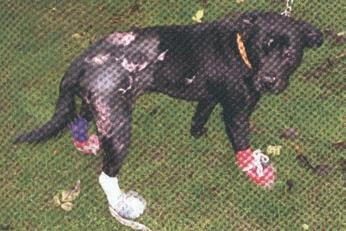
“When 11 month old Border Collie ‘J.J.’ came into our care, she had a pin / plate poking through
a badly infected front leg, a paw so badly crushed the bones had fused together and a stab wound.
“Her original owner pleaded guilty to causing unnecessary suffering to a protected animal and was fined £2,000 and banned from keeping an animal for ten years.

“As you can see from the wonderful photo below, ‘J.J.’ went on to much better things.”
Gifts in wills fund almost one in two veterinary treatments and so legacies are an absolute lifeline to the rescue and spaying/neutering work carried out by Friends of the Animals.

Helen continued: “Friends of the Animals has a policy of non-destruction, unless an animal is sick or injured with no hope of recovery, and we keep admin costs to a minimum. Very importantly, 96% of our staff are volunteers, which ensures as much of your gift as possible is spent on saving animals.”
Pitted against that constant battle to save animals was the action of the person who set fire to the front of the Charity's base.

“But, happily,” said Helen, “we're a resilient team and together with the help of supporters, we barely skipped a beat and just kept on going.
“We truly appreciate that people have many choices regarding charities to support, but no one appreciates it more, or tries harder than we do, to get the very best possible use from every penny donated. Thank you for your consideration.”

[ WITH ESCALATING LIVING COSTS
impacting on households across the UK, a recent webinar for members of Remember A Charity brought together legacy experts from different areas of the sector to discuss what can be expected for the legacy market in the coming months. Following the webinar a number of participants shared their ‘takeaways’ from the event.
The webinar was led by Legacy Foresight’s economist Jon Franklin, Alex McDowell of Revitalise and legacy specialist Sanita Guddu.
Jon Franklin shared a message of cautious optimism, despite the economic storm clouds gathering. The legacy market is generally resilient, he found, and less likely to be impacted by a recession than other areas of fundraising.
However, the slowdown in income will be offset by continued growth in the number of gifts as a result of rising death rates from an ageing population.
Legacy income remains on a long-term growth trajectory. UK charities are expected to raise around £20bn through gifts in wills in the next few years alone.
Jon explained: “Legacies tend to be relatively resilient, but with the cost of living affecting giving behaviour it’s important
for charities to work hard to remain front of mind. The pandemic and cost-of-living crisis have all affected people’s confidence. Still, we know that for the younger boomer generation, altruism and giving is very important; and that means that there is huge potential.
“Charities need to develop the kind of proposition that helps those supporters stick to an organisation and cause because, if you can get a share of that potential income from the increased deaths that we’re expecting over the next 15-20 years, then that really will make a huge difference.”
Highlighting the importance of internal buy-in for legacies, Alex McDowell, director of fundraising at holidays-for-disabled charity Revitalise, said: “For charities, the biggest challenge isn’t making the case internally that legacies are important; this has already landed. Legacies are the bedrock; people get that now. The real challenge is the harsh reality that money will go a lot less far and, when people are facing the decision of investing in big returns tomorrow rather than paying the bills now, that can be a tough call.
“There’s always going to be other income streams that will deliver more quickly. In this environment, we need to be even smarter about how we frame the need for legacy
investment and in keeping legacies front-of-mind.
“For example, identifying where delivery of legacy messages can support other corporate objectives, such as brand awareness or supporter retention and how the charities’ other activities can support or incorporate legacy messages.”
Reflecting on the success of a recent legacy telemarketing campaign in the current environment, Sanita Guddu highlighted how one charity she was working with had seen a 36% legacy enquirer conversion rate, saying: “Legacy campaigns can be really powerful when we take time to understand our supporter base and respond to their needs. The results from this campaign were far higher than the norm and this was because everyone was spoken to as an individual.
“We need to stop looking at supporters as cohorts, based on where we think they’re at, and instead have one-to-one conversations where we can adapt and flex to each person’s situation.
“You need to find out what your organisation means to a supporter, explore their motivation and take it from there. It’s all about the individual and stewarding those relationships.” q
[ THE IMPORTANCE OF LEGACIES to charities’ income during hard times was emphasised by Legacy Foresight’s Legacy Market Briefing 2022, published in October. The research forecast that legacy income is set to reach a record £4bn by the end of the year – an increase of 14% on 2021. That figure is a reflection of the buoyant housing market over the past two years and some recovery from on-going issues in the probate administration process.

However, with charities facing rapidly rising costs, the real value of these legacies will be eroded, potentially reducing the level of services or charity activities they will be able to fund.
In the future, the predicted downturn in the housing market is likely to have some short-term impact on average legacy gift values. But that will be offset to some degree by an increase in deaths.
Economist Jon Franklin said: “These are understandably worrying times for all, the non-profit sector included. However, our forecast shows the remarkable resilience of the legacy sector, and how charities must continue to invest in legacy fundraising as one of the most reliable sources of income to carry out their vital work.”
Lucinda Frostick, director of Remember A Charity, commented: “In troubled times, the steady bedrock of legacy income is all the more crucial. This forecast highlights just how important it is that we continue to work together to keep legacies front-of-mind for supporters – and within charities, too. The value of legacy donations may well take a hit in the short term, but if the focus remains on stewarding supporter relationships and delivering sensitive, inspiring legacy fundraising, the outlook for longer-term growth is considerable and income from gifts in wills really will be a lifeline for an increasing number of charities.” q
[LEGACIES ARE VITAL to the animals of Oak Tree Animals’ Charity: they would not have been able to move to their current home at Oak Tree Farm, Carlisle in 1982 without generous gifts through wills. All donations, regardless of size, provide a lifeline to the animals at Oak Tree. More than half of the work carried out there is paid for by legacy gifts, and they couldn’t help the number of animals they do without them.

Choosing to leave a gift in a will is an exceptionally personal way to help. One supporter who chose to leave a legacy to Oak Tree explained her decision: “My lifelong love for animals and the knowledge that my gift will help support and rehome unwanted animals at Oak Tree Animals' Charity in the future gives me a great sense of happiness. I wish more people would support animal charities like Oak Tree and be part of their incredible work. I want to help Oak Tree Animals' Charity continue its wonderful work for many years to come. It is comforting knowing that I will still be able to support animals long after I am gone.”
To find out more about Oak Tree Animals’ Charity, or to enquire about leaving a gift in your will, visit www.oaktreeanimals.org.uk or email fundraising@oaktreeanimals.org.uk q
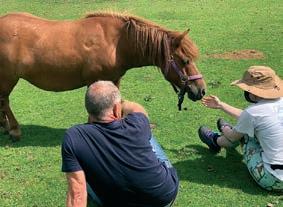
[SINCE 1976 Devon Horse and Pony Sanctuary have rescued, rehabilitated and cared for many horses, ponies and donkeys – including local Dartmoor ponies. Since 1993 they have also taken in, when asked, retired police horses from the Metropolitan Police or the Avon and Somerset force. Those horses have come to the end of their working lives for one reason or another and the sanctuary provides them with a safe and ‘forever’ future.
The police don’t have the resources to look after their retired horses, so all funds to keep those animals have to be raised by supporters of Devon Horse and Pony Sanctuary. They are away from the stresses of police life in a wonderful location on the edge of Dartmoor.
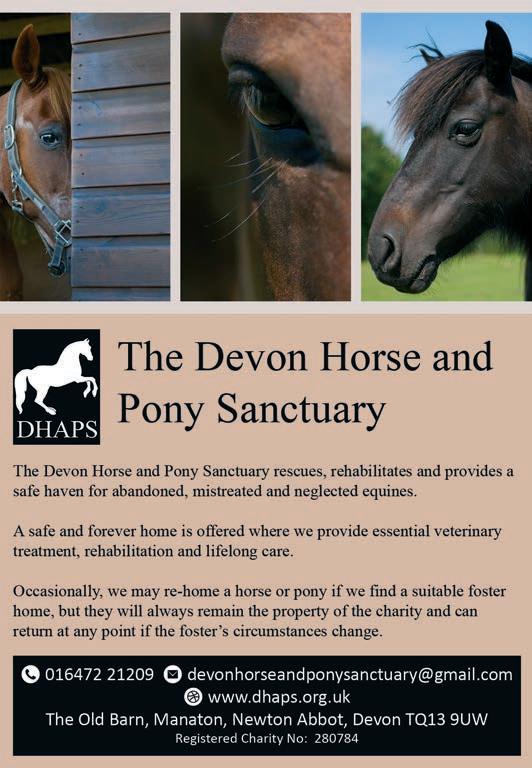

Every animal can give something back to help alleviate the stresses of life, so in reality helping them can also help us.

Said the sanctuary’s Chris Hills: “This amazing place provides a haven of tranquillity, and we welcome visitors who may also need a little help and support to come and enjoy time with our horses and ponies.
“Your legacy gift will help us to give the very best care and attention to our rescued horses, ponies and donkeys, both in the physical and emotional sense. We would like more people in need to spend time with these amazing animals and benefit as we and our amazing band of volunteers do every day and gain a little respite from the rigours of daily life.” q
[
THE FIRST PIECES of secondary legislation to bring various provisions of the Charities Act 2022 into force have been enacted and those provisions became law on 31 October 2022.
One area of the new law that was identified by the Institute of Legacy Management (ILM) as being of relevance to its members was the section containing the new Cy-près regime, which came into effect from 31st October. That section clarifies what can happen when funds raised or given for a specific purpose cannot be used for that purpose. Cy-près is a term meaning ‘nearly the same’ or ‘near enough’.
The guidance from the Charity Commission also explains how charities can avoid being in that position by giving thought to how they word an appeal. It also provides advice on record keeping and what information they should retain.
Another area of interest to legacy managers is the change in the law regarding ex gratia payments.
Writing in September, the ILM stated: “As many of you will know, the new ex gratia regime has been put on hold pending a review as to whether they could be used for the repatriation of museum objects. We have spoken to contacts in the museum sector who have told us that this is a real possibility that they have been looking at.
“We have been in touch with the Department for Culture, Media and Sport and the Charity Commission to try and get a sense of how long the review might take, and therefore when the ex gratia payment provisions are likely to be introduced.
“We have been told that for the time being the Charity Commission expect charities to follow the existing regulations, and continue to apply to them for permission to make ex gratia payments.”
The next tranche of statutory instruments needed to implement further parts of the Act are expected in the spring as more elements of the Act come into force. q
[ THE DEADLINE for the Smee & Ford Legacy Giving Awards 2023 has now passed, having been extended to 9 December.
The inaugural Smee & Ford Legacy Giving Awards will bring together legacy professionals from across the charity sector to recognise and celebrate the significance and contribution of legacy income for charities and their beneficiaries. They will shine a light on the successes and achievements of legacy administration and legacy fundraising individuals and teams who go over and above. Often overlooked within charities and across the sector, there has never been a better time to reward the hard work and dedication of the people behind legacy giving.
The awards will be presented during the afternoon of 27 April next year at the Hilton Bankside, London. It will follow a morning session of ‘high-level thoughtleadership to inspire you and your team’.
The judges include Matthew Lagden, CEO of the Institute of Legacy Management, legacy fundraising specialist Sanita Guddu, Great Ormond Street’s legacy officer Rosalind Sherlock Jones and Richard Radcliffe, founder of Radcliffe Consulting.
Regardless of a charity’s size, winning a Smee & Ford Legacy Giving Award will provide an independent and meaningful endorsement of the successes and achievements of individuals, teams, projects and campaigns.

Presented by a celebrity host, and with 22 award categories covering legacy administration and legacy fundraising, the afternoon offers an opportunity to salute the stars of the sector. q
[THE MISSION of Three Counties Dog Rescue is to accept, care for and find homes for unwanted, lost and stray dogs and cats and to ensure their wellbeing afterwards. The charity was founded in 1971 and since then they have improved the lives of over 7,600 dogs and cats.

Before rehoming, all animals are vet checked, neutered, vaccinated, microchipped and kept in suitable conditions. Rehabilitation costs are a major part of the charity’s annual expenditure of over £200,000.
Healthy animals are never put down. As part of that non-destruction policy, several elderly dogs are kept in long term foster care. However, this means that the charity can incur large veterinary costs to maintain a dog’s health while they await a new permanent home. They now provide boarding and cremation services with profits supporting the Rescue.
Every penny raised goes to improving the lives of dogs and cats. Three Counties Dog Rescue is run entirely by voluntary and unpaid helpers, who also meet their own expenses. q

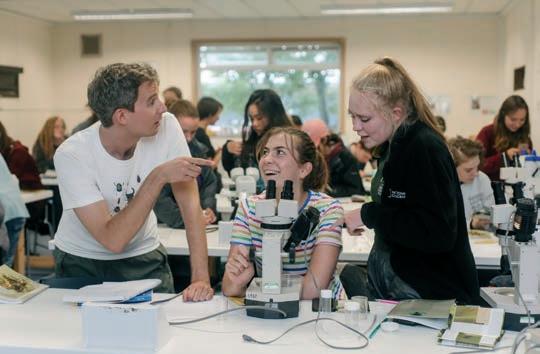
[THE WORLD is facing huge environmental challenges: from climate change to plastics in our oceans. We need a new generation of ecological scientists to search for the solutions; however, getting a start in ecology is not easy, particularly if you are from a lowincome background. Thankfully, the British Ecological Society (BES) – the world’s oldest ecological society – is doing something about it. Every summer BES takes 35 motivated young people from low-income backgrounds on their first residential ecology field course.
The Ecology – the Next Generation summer school lasts five days and the young people are taught by leading ecological scientists. Successful applicants pay nothing to attend and they learn vital skills to help them build a career in academia and the green economy. The leading academics and consultants who teach the young people provide their services free of charge.
“We take talented students from low-income and black and minority ethnic backgrounds and expose them to the relevance of ecology in our world and the breadth of opportunities and careers open to them,” explained Karen Devine, BES Director of Education and Community Engagement.
“We help give them the support and mentoring they need to launch their career, including research or working as an ecological consultant, having never considered taking a degree in ecology or the natural sciences or understood the rewarding careers on offer after they graduate.”
The Ecology – the Next Generation summer school is not a holiday. A 6.00am start for bird watching is followed by a day spent out in the field and in the lab. A researcher might lead the group through an area of freshwater ecology, then Environment Agency staff will set a hands-on task about mapping flooding locations locally. The students will then make decisions on where to build houses and flood defences. Evenings are spent discussing all they have learnt: then out into the night – bat detector in hand.
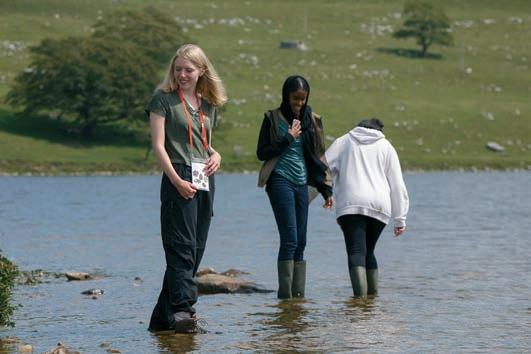
The young people get to work alongside experts who are world leaders in their field and with support from mentors who are from similar backgrounds. They spend time with ecologists who are passionate about what they do.
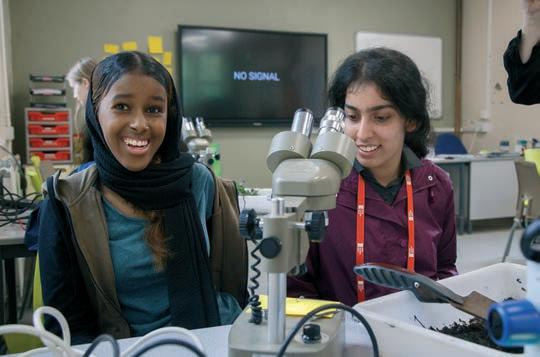
The young people then think: I could be that person! “That changes everything,” said Karen Devine.
“It’s inspirational, really,” said John Condron, MD of ecological consultancy Ecology Resources Ltd – which he founded with his wife Naomi. John grew up on an Inner London council estate and is now a sponsor of this year’s summer school. John and Naomi have provided a £2,500 bursary for one of the participants to invest in equipment, books and field courses.
John continued: “It’s great to see a lot of diversity at last. Ecology can be a very white, middle-class profession. From my visit I can see that the Ecology – the Next Generation summer school reaches out to young people who otherwise would not have the same access to support as some of their peers. That is very important: it can open up the eyes of kids to nature, ecology and wildlife.”
• By card: britishecologicalsociety.org/donate
• Facebook: Visit BritishEcolSoc and click on the donate button
• By cheque: British Ecological Society, 42 Wharf Road,
• London N1 7QS.
• By BACS: British Ecological Society, Barclays Putney UK Sort
• Code 20-90-69. Acc. No. 70208736.
• SWIFT/BIC BUKB GB22. IBAN GB59 BUKB 2090 6970 2087 36.
• Your ref: NxtGen. q
• Founded in 1913
The British Ecological Society is a Registere d Charity No 281283.

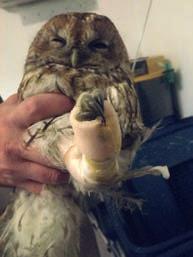
[
ESTABLISHED IN 2001, the Suffolk Owl Sanctuary – known, appropriately, as S.O.S. – operates a comprehensive facility for the rescue, care and rehabilitation of owls across East Anglia. It also promotes the need for the conservation of endangered owl species throughout the UK with its Saving Britain's Owls initiative.

The S.O.S. owl and raptor hospital at Stonham Aspal is unique in the region. It is specially equipped for the care and treatment of the many injured wild owls and other birds of prey it receives every year as a result of road traffic accidents, mishaps, starvation, trauma, disease, poisoning and sometimes even shooting or trapping.
Many of the birds can be given a recuperative, short-term pick-me-up before being re-released into the wild. Those that are more seriously injured but stand a chance of recovery are given medical aid and/or surgery, as determined by their vet. The birds are then allowed space and time to fully recuperate in one of the secluded recovery aviaries, before being carefully returned to the wild.
S.O.S. is regenerating its wild owl nest box scheme that includes building, locating and curating long-lasting, environmentally-friendly nest boxes in appropriate locations to replace the gradual erosion of natural nesting sites.
S.O.S. is funded purely by donations, and as a small charity the legacies it receives play an important role in enabling it to continue developing its resources in the interests of conserving owl and other bird of prey wildlife in the UK. q
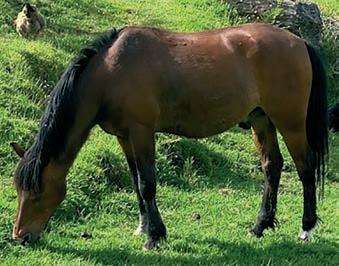
“We have been a charity since 1991, but our team has been doing this work since the 1960’s,” explained the charity’s founder Roy Peckham.
“We found pit ponies still at work in the small private mines in Wales and became their salvation by creating The Pit Pony Sanctuary

“Over the years we have taken in numerous needy horses and ponies, including some old pit ponies. Our only surviving pit pony ‘Spike’ toiled in several small mines in the Swansea Valley. Although elderly, and needing tender loving care, he is in good health now and enjoying his life at the centre.
“Help us make success stories like Spike’s. Our donors change lives, and you can, too!” q

However, after a brief respite of holidays and hospitality, the storm clouds of the cost-of-living crisis could no longer be ignored. Charities that struggled through the last two years by relying heavily on the income from gifts in wills are again looking to legacy teams for a way through this new crisis.
#ELA22 was a unique day created especially for all involved in legacy admin and management. It was a timely chance to catch up with the very latest sector data, trends and timelines, hear about best practice case studies from 2022 and assess how to further advance and improve legacy admin functions in the coming year.
At the online conference over 200 delegates from the legacy community examined how the ripple effect of inflation, energy bills and equity release are combining into potentially the most significant threat to fundraised income that charities have seen in decades. It combined panel sessions, data analysis, case studies and TE-style talks from leading experts in the sector to provide the latest thought leadership on legacy administration strategy and best practice, offering solutions to the challenges the sector will face in 2023.
In addition to the cost-of-living crisis, key themes included: Spotlight on legacy income and probate notification data. Experts from Smee & Ford, the Institute of Legacy Management and HMCTS offered their analysis of the current landscape for gifts in wills.
Contested wills – causal area, economy or COVID? Contributors examined what is behind the significant spike in contested cases and looked at how legacy teams can deal with the uptick with already stretched resources.

An exclusive update from HMCTS on probate notifications saw its probate operational support manager Stephen Burgess provide the latest insight into the work of the HMCTS, their progress with probate digitalisation and how the new processes are helping their communications with charity legacy teams.
The session looked at the reasons behind the continued aboveaverage death rates, the impact it is having on HMCTS and the factors contributing to the backlog of live cases.
Other important discussions revolved around Forecasting legacy income during uncertain economic times and Finding the next generation of your legacy team
The digital format once again enabled speakers from charities outside the UK to view and participate in the summit and their contribution to the day was warmly welcomed. q
[HESSILHEAD WILDLIFE RESCUE TRUST is situated near Beith, in North Ayrshire. It was set up as a charity in 1986, although its founders Andy and Gay had been caring for injured and orphaned wildlife since 1970, when they rescued a fox cub from a gamekeeper and his dogs. As the number of casualties increased year on year, Andy and Gay needed financial and practical help.

Once the trust was set up, new aviaries and enclosures were built. A membership scheme proved popular and many volunteers were recruited. The centre now occupies a 20-acre site, including woodland, marsh and open water. That gives a variety of release sites for its patients.

Approximately 3,500 wildlife casualties are now treated each year, with the aim of returning them to the wild. Among the many hedgehogs, foxes and familiar garden birds there are deer, otters, badgers and seals. All have been rescued and are rehabilitated. In addition, swans are treated regularly, along with buzzards, peregrines, herons and sea birds.
The centre operates a 24-hour rescue service and there are more than 60 enclosures and aviaries, a hedgehog hospital, a seal/swan unit and intensive care facility. It also offers training courses on the handling, care and treatment of wildlife casualties.
Spring and summer are especially busy, with hundreds of nestling birds being hand reared. Care is taken to rear all youngsters with minimum human contact. That prevents wild birds and mammals becoming too used to people, so giving them a good chance of survival in the wild.
Hessilhead is primarily a voluntary organisation. Its volunteers help in many ways: fundraising, building and maintenance, driving patients to the centre and daily cleaning and feeding. q
[
TODAY, ONE IN 700 BABIES in the UK are born with a cleft lip and palate, the most common form of birth defect.
The impact on a child’s life as they grow is profound. It may affect not only the way they look, but also their speech, hearing and dental development. And it can leave deep psychological scars.
In the developing world, patients with clefts are frequently not operated on until later in life, if at all. As a result, they may be malnourished and unable to talk well or hear properly. Often, they will be social outcasts.

At CLEFT, our vision is of a future where clefts are preventable. Until we get there, we want to improve the lives of those born with cleft lip and palate – in the UK and in poorer countries around the world.
By funding research, we continue to make headway into understanding why clefts occur and to deliver pioneering new treatments that deliver kinder, more effective and more efficient care for children with cleft lip and palate.

By supporting the development of cleft centres in low and middleincome countries we aim to give children born with clefts in these poorer countries the same opportunities available to children in the UK. Each donation takes us a step closer to reaching our goal. All gifts could have a direct impact on changing the lives of many hundreds of thousands of babies and children around the world.
Please join us and help us prevent clefts for future generations. q

[
ZANE: ZIMBABWE A NATIONAL EMERGENCY is a UK registered charity working to help the most destitute, vulnerable and impoverished people in Zimbabwe. It is the largest supplier of financial aid to elderly people in Zimbabwe who lost their life savings and pensions in the economic collapse and subsequent hyper-inflation.
This includes around 560 frail veterans and their widows who fought for the Crown. ZANE assists with rent, medical bills and food – and, crucially, also provides comfort, advice and support.

In addition, ZANE funds a clubfoot correction programme, successfully treating over 4,500 children to date. It funds the provision of prosthetic limbs for victims of landmine explosions and assists people with hearing loss. ZANE also funds education programmes including the provision of pop-up classrooms in highdensity townships for children who would otherwise not receive an education. It runs creative therapy workshops for women living in extreme poverty who are victims of political violence and trauma.
Zimbabwe remains in a state of crisis. The economy teeters on the brink of collapse. Fuel shortages are commonplace and with food prices escalating, ZANE’s aid is needed more than ever by the most destitute people in Zimbabwe. q
[
WHILE THE CHANCELLOR’S
Autumn Statement disappointed many in the non-profit sector, with concerns raised about the lack of support for charities, one measure – the freeze on inheritance tax – could be good news for future legacy income.
In his statement, Chancellor Jeremy Hunt confirmed that the IHT threshold will remain at its current level until 2028, with the standard and residence nil rate band at £325,000 and £175,000 respectively.
The standard nil rate band has been at £325,000 since 2009, which, if it rose with inflation, would equate to over £400,000 now, according to sector journal Today’s Wills and Probate. By keeping that threshold static, many more estates are subject to inheritance tax. That may lead more people to consider leaving legacies in order to limit IHT.

Lucinda Frostick, director of legacy umbrella body Remember A Charity, explained: “While tax can eat into donors’ pockets and reduce the amount they feel able to give – particularly when living costs continue to rise – inheritance tax differs in that it’s less likely to impact people’s disposable income. Ultimately, the more estates that are eligible for inheritance tax, the more people will be looking

[ALMOST FIVE MILLION surgical patients are admitted to hospital every year in England alone, so choosing to leave the Royal College of Surgeons of England a gift in your will can have a direct impact on the future of surgery and in maintaining and supporting the enhancement of surgical care for patients.
Legacy gifts: sisters share a vision for the future
Miss Margaret Witt FRCS (1930-2005) was a consultant obstetrician and gynaecologist. In 2009, her significant legacy founded the Margaret Witt Fund, the income of which is used to award annual scholarships to attend an RCS England course.
Over the next 11 years, Margaret’s sister Lorna was notified of the awards given in her sister’s memory and now in 2022, following the sad news that Miss Lorna Bartlett (1931-2021) had passed away, RCS England are honoured to receive a bequest from her to be placed the same fund.
Margaret’s bequest and then Lorna personally seeing the successful outcomes of the awards inspired her to support them too. Together, these sisters have ensured the award’s longevity for decades into the future.

Legacies can support any area of the college’s work; unrestricted contributions can be used wherever the need is greatest and many support an individual project or surgical specialty. Ultimately, RCS England want to understand what their supporters would like their gift to achieve. q
• To get in touch you can email fundraising@rcseng.ac.uk or if you would like an informal chat, please call Nicola on 020 7869 6086.
for ways to minimise that tax and the more advisers will be focusing on supporting clients in this space. The tax incentives on charitable giving are extremely generous and that makes legacy giving an important part of those discussions.”
Charitable gifts are exempt from inheritance tax and when people choose to donate 10% or more from their will their remaining inheritance tax bill is reduced by 10% –charged at 36% rather than 40%.
That makes legacy giving hugely efficient for those who wish to support good causes. It also gives solicitors and financial advisers a reason to bring charitable giving into discussions around estate planning and will-writing.
Lucinda Frostick added: “Our behavioural insights solicitor trials show that even the simplest reference during will writing to leaving a gift doubles the chances that the client does so. The inheritance tax freeze will drive more conversations in this space and that is something to be welcomed.
“But it also emphasises just how important it is that that we continue to work closely with the professional adviser community – solicitors, will-writers, wealth managers and others – to ensure they highlight that message to clients in the most effective and informed way.” q

[
ONE IN SIX PEOPLE in the UK has a neurological disorder: that amounts to 16.5 million mothers, fathers, sons, daughters, friends and colleagues. Improving the outcome and quality of the lives of those affected is the driving force behind The National Brain Appeal, which funds pioneering research and provides access to the very latest technology for clinicians and researchers working in this field.
The charity dedicated to raising funds to advance treatments and research at the National Hospital for Neurology & Neurosurgery and the Institute of Neurology – together known as Queen Square – is The National Brain Appeal.
The driving force behind the charity’s work is the aim to improve the outcome and quality of life for everyone affected by a neurological condition. They include brain tumours, stroke, epilepsy, dementias, MS, motor neurone disease and Parkinson’s disease: all of which have no cure as yet. They look to achieve that vision by funding state-of-the-art equipment, major building programmes and life-saving research – over and above what the NHS can provide.
Legacies represent up to one quarter of The National Brain Appeal’s annual income. “They are crucial to the fundraising work we do,” said chief executive Theresa Dauncey. “We’re extremely grateful for every legacy left to us. Leaving just 1% of your estate can make a very real difference and is an investment in the future. The more money we receive, the more support we can give to the National Hospital, which in turn improves the prospects for those affected by neurological disorders.”
Penelope was diagnosed with multifocal motor neuropathy (MMN) in 2004 at the National Hospital for Neurology & Neurosurgery and attends a day care clinic run by a team of specialist nurses.

“My own personal journey with MMN makes me want to give back in whatever way I can,” she said. “That is why I have left a gift in my will to The National Brain Appeal. I want to help to fund crucial research into all neurological conditions going forward.”
Meta is a former National Hospital patient. She had successful surgery for a benign brain tumour there in 1988. Since then both her husband and sister were diagnosed with neurological conditions.


She explained: “My husband was diagnosed with Parkinson’s and sadly passed away just a few months ago. My sister has multiple sclerosis – she’s been living with it for more than 25 years now. These are cruel diseases for which there is no cure and little hope.”
With that in mind Meta has made The National Brain Appeal a major beneficiary in her will.
“The lack of a cure for so many debilitating neurological conditions is a strong motivator for me to want to help,” she continued, “and by leaving a legacy I can be part of something that will provide hope for others.”
Now more than ever, benefactors to The National Brain Appeal can control where they would like their money to go. There are six specific funding areas for which individuals can make a legacy pledge:
• Neurology: funding initiatives to improve diagnosis and treatment, and
• provide facilities for those with on-going neurological conditions
• Neurodegeneration: supporting projects which help people with


• conditions where there is progressive degeneration
• Neurosurgery: providing state-of-the-art equipment and facilities for the

• UK’s largest neurosurgery unit
• Technology and innovation: supporting projects which translate
• groundbreaking ideas into better results for patients
• Education and staff development: investment to provide the best
• opportunities and attract the best people in the field
• Queen Square: new facilities and staff-led projects at the National

• Hospital and the Institute of Neurology
For those who do not specify a funding area, their gift can be put towards an area with the most urgent need. q


Without the generosity and foresight of those who leave a legacy, we simply could not support the number of vital projects that we are currently able to.
• For more information about legacies and the National Brain Appeal, contact info@nationalbrainappeal.org or view the legacy section of the website at nationalbrainappeal.org/legacy

[
PROMOTING AND ASSISTING in access to justice in the Family Court is the aim of Parenting Together, a charity set up by former youth worker Gerry Hannah.
Gerry points out suicide is the most common cause of death among young people – often prompted by the depression caused by family break-up. He believes that in many cases the break-up of the family is avoidable if parents are able to present their version of events.

Said Gerry: “British Family Courts sit in private and they convict parents merely on the ‘balance of probability’. In some cases a judge is persuaded to make a misinformed decision based on race, gender, heritage, beliefs and social status – often causing serious depression which can have lethal consequences.”
Gerry formed his association with humanitarian experts and professionals to ensure low-income, disadvantaged parents involved with social services or Family Court proceedings receive fair and equal justice.
He added: “We mostly provide specialist legal services, advocacy and reports for disadvantaged parents in Family Court proceedings. Our experts, professionals and associate solicitors often work pro
bono to help us resolve exploitation and unlawful abuse of the family law and child protection systems. We framed our projects on the government’s Every Child Matters report, published in 2003, that recommended engaging families in the care and protection of children.”
He points to cases of parents with learning difficulties asking people on social media for advice when they cannot understand the legalese, acronyms and procedures.
“They are usually misguided, posting views and comments that go against them in court. Their social media ‘friends’ are often predators who exploit single parents with young children. We recently submitted evidence to the CPS against a few of these sexual predators targeting our vulnerable parents and their children.”
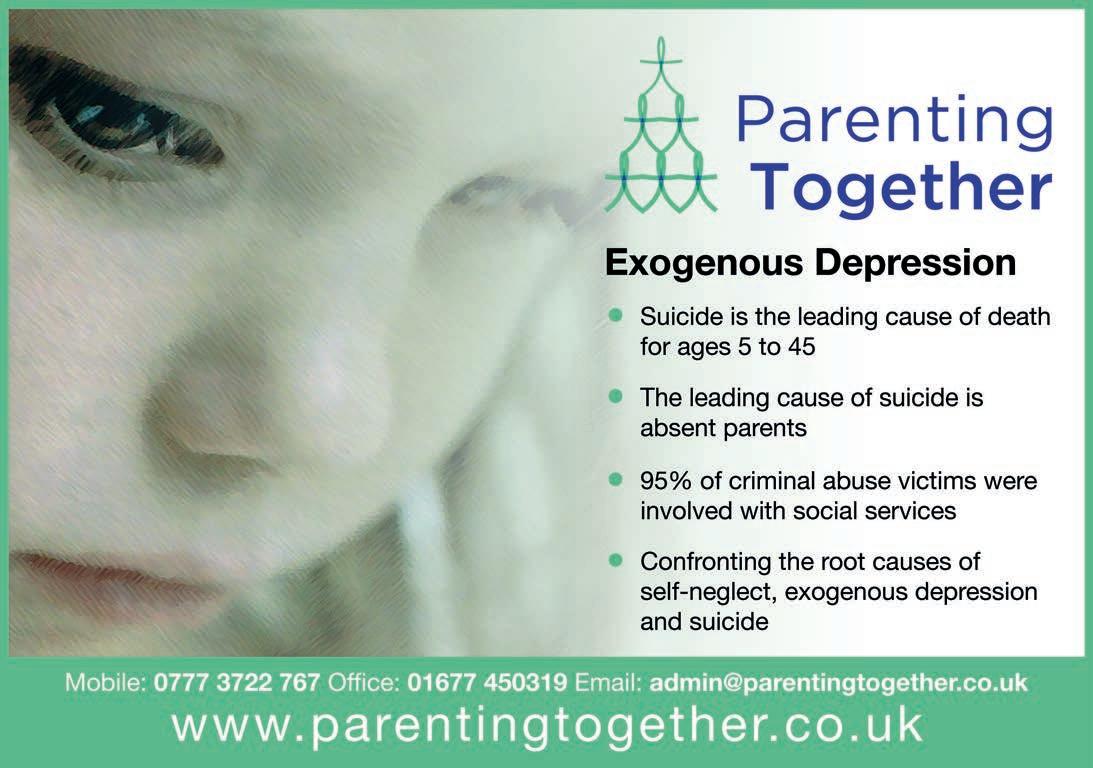
The current project is a continuation of Honeypot Families , a work-in-progress study comparing families in the safest happiest regions of the UK with families in what Gerry describes as ‘the most dangerous city in Europe’.
“We concluded that Judeo-Christian families functioned efficiently to provide the best outcomes for everyone because they are based on a mutually agreed contract where adults vow to love, care and respect each other until death.” q
[ DESPITE THE FACT that the growing number of ‘digital legacy’ donors use a multiplicity of channels depending on their demographic – across generations and genders – often the channels legacy fundraisers use to reach them are the same. Research carried out by Legacy Foresight, part of Legacy Futures, has shown that different digital channels have different roles to play when it comes to legacy fundraising.
Anna Turner, head of research and insight at Legacy Foresight, has shared her insight into how charities are harnessing the power of digital to boost their legacy fundraising – using different channels to convey different messages.
She explains that, while social media and paid digital advertising are good at raising awareness and generating leads, video is a great medium for storytelling, and email works well in developing relationships with supporters – keeping them updated on the vital work of the charity and any news or events.
“And things change,” she continued. “For example, Facebook as a platform has become crowded and costs have risen, so charities need to think creatively to maximise budgets and standout. The constant stream of new technologies and platforms offer new opportunities for charities to give their messages cut-through and cultural relevance; but rather than jumping on every new technique and platform, it’s about focusing on the right things.
“Corporate and consumer brands have been experimenting with new platforms and using social media in an innovative way right from the start – they often have the budgets to do so. But charities are innovative too. It may be that the total audience will be smaller than can be reached through a more mainstream medium, but if there is a strong link between the message being delivered, the audience and the communications environment, then the overall campaign can have more relevance and resonance and greater cut-through.”
She pointed to a number of examples of charities using different digital channels to good effect.

[FAILING EYESIGHT is nothing short of a personal catastrophe. Do you have a family member, friend or neighbour who is gradually losing their sight?
Reading, recognising friends and living skills are all affected as your sight is going – and it’s much harder if you live alone.
The National Federation of the Blind of the UK (NFBUK) keeps its members in touch with general information, help and updates on what’s going on.

The charity produces bi-monthly news magazines and circulars in audio, braille or electronically, which members can read independently. It also encourages blind and partially sighted people to play a fuller part in society. q
• For further information contact NFBUK on 01924 291313, email admin@nfbuk.org or visit www.nfbuk.org
Measuring impact is not as straightforward as may be taken to be the case given the immediacy of digital channels.
“It’s vital to remember that brand communications, fundraising communications and legacy communications are interconnected. All activity helps people feel close to the charity and drives loyalty, connection and long-term support and essentially ‘paves the way’ for a legacy ask or an on-going stewardship journey.”
So how do charities access the best advice on digital? Organisations such as Media Trust, Digital Europe and Google Digital Garage offer some fantastic training for free, so people can stay on top of their game, she advises.
It’s also essential to undertake monthly CPD, have regular brainstorming meetings and keep abreast of the media and news stories so charities can ensure that any communications are topical. q


[THERE ARE OVER 130,000 PEOPLE living with multiple sclerosis (MS) in the UK, and nearly 7,000 newly diagnosed cases each year.
Life with MS can be tough. It’s unpredictable, and different for everyone. It’s often painful, exhausting and can cause problems with how we walk, move, see, think and feel. But thanks to support from kind people like you MS research has made huge leaps forward.
Right now we are funding over 40 projects to help improve diagnosis and treatments, along with providing a wide range of services and support to make sure no one has to face MS alone.
With ground-breaking discoveries and new knowledge gained on potential ways to repair myelin and protect nerves, along with new projects and clinical trials underway, there’s real momentum and hope on the horizon. We simply can’t afford to stop now as we invest in research to help find treatments that, for the first time, could stop and, maybe one day, even reverse the progression of MS.
that’s being carried out by the MS Society.

Laurence tells us: “Including a gift in your will to the MS Society could make a huge difference to the future for those living with MS, supporting the vital research that’s needed to stop this condition.” They

both agree: “That’s why we chose to support MS Society’s latest gifts in wills campaign, so we can let people know that including a gift in your will to stop MS could help finish the work that’s been started and transform the lives of thousands of people living with MS.”
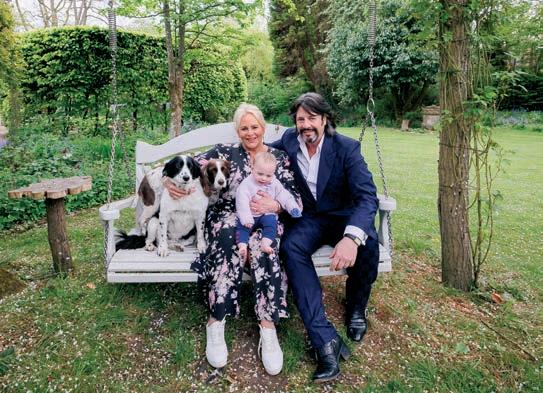
If you’d like to join Jackie and Laurence and be part of a community of people bringing us closer to stopping MS – whether that’s through providing information and support, continuing to fight for access to new drugs, or supporting vital future research – please think about supporting our work in the years ahead by including a legacy gift to the MS Society when you next make or update your will.
We understand that making sure you protect the financial future of those you love is your priority when writing your will. But over 40% of our income comes from those who’ve also included a legacy gift to the MS Society, and no matter the size of your gift, it’s thanks to support from people like you, that we’re getting closer to stopping MS, transforming lives and making sure our children, grandchildren and future generations will live in a future free from its effects forever.
With your support, the future is bright for people living with MS. Let’s finish the work we’ve started and stop MS together. q
• For more information related to gifts in wills and the services we offer please call 020 8827 0374, email legacies@mssociety.org.uk or visit legacies@mssociety.org.uk/gifts-in-wills
[INVESTIGATING AND CAMPAIGNING against environmental crime and abuse is the 35-year struggle of charity Environmental Investigation Agency UK.

Its undercover investigations expose transnational wildlife crime – with a focus on elephants, pangolins and tigers – and forest crimes such as illegal logging and deforestation for cash crops such as palm oil. The charity works to safeguard global marine ecosystems by addressing the threats posed by plastic pollution, by catch and commercial exploitation of whales, dolphins and porpoises.

More generally, they help to reduce the impact of climate change by campaigning to eliminate powerful refrigerant greenhouse gases, exposing related illicit trade and improving energy efficiency in the coolant sector.
The findings of their investigations are used in hard-hitting reports to campaign for improved governance and more effective law enforcement – such as its latest Running Out of Time report, which examines the fast-growing role of Vietnam as a hub for illegal wildlife trade and the country's failure to respond to the crisis.
Their field experience is used to provide guidance to enforcement agencies and they form partnerships with local groups and activists to support their work through hands-on training.
The scale of the problems they face can be disheartening and the truths they uncover can be shocking. Their programmes of work build on decades of campaign successes and nail-biting undercover investigations by a small group of tenacious activists, from documenting
the slaughter of pilot whales in the Faroe Islands, to securing a global ivory trade ban at CITES, contributing to the Montreal Protocol on climate change and the adoption of the EU Timber Regulation to protect forests. A gift to EIA in your will is an investment in wildlife and habitat conservation. They have already achieved so much, with your help they will continue to keep the pressure on for generations to come. q
• For further information tel 0207 354 7960 or visit the website at eia-international.org


[ONE OF THE MAIN ELEMENTS of the Charities Act 2022 that came into force in the autumn dealt with what charities should do if they raise more donations than they need for a particular cause, don’t raise enough, or cannot achieve their purpose – the so-called Cy-près regulations.
In light of those changes, the Fundraising Regulator’s head of policy Charlotte Urwin published a guide to the changes on the regulator’s blog page.
She pointed out that the UK public is extremely generous: in 2021 they donated £10.7bn to charities, but there are many different causes donors could support.
“Sometimes a charitable fundraising appeal catches the public imagination and your appeal far exceeds the amount you were hoping to raise. At other times, your appeal might not reach its target despite your best efforts.”
That is where the law on ‘failed appeals’ comes in. Ms Urwin explained: “When charities make an appeal for a specific purpose, they must use the donations given to that appeal for that purpose. But what should you do if you raise more than you need, or if you don’t raise enough, or if circumstances change and you cannot achieve your original purpose?
“The new Charities Act 2022 is introducing greater flexibility for charities in England and Wales about how to deal with these situations – sometimes called ‘failed appeals’. Even so, you will need to follow a legal process and cannot simply spend the funds on something else straight away. Administering the funds that you can’t spend on the intended purpose takes time and resource. To avoid being in this situation, start by making sure you include a ‘secondary purpose’ when you launch your appeal.”
A secondary purpose is wording in an appeal that states how donations will be used if, for example, funds exceed or don’t reach the target.
She quoted Standard 2.7.5 of the Code of Fundraising Practice, which states that: “If you are fundraising for a particular purpose, you must include a statement saying what will happen to funds you receive if the total amount raised is not enough to reach (or is more than) the target.”
That could be as simple as stating that funds will be used for a charity’s other projects. Including that information in the appeal wording means that if the intended purpose cannot be achieved, or the amount raised is not enough or too much, the charity will be able to use the donations straightaway for the secondary purpose.
She warned: “If you haven’t included a secondary purpose and you cannot achieve the intended purpose, don’t raise enough, or you raise more than you need – legal requirements kick in.
“Where you cannot achieve the intended purpose of your appeal and/or have not raised enough, these requirements may include setting out a plan on how you propose to contact donors to offer them a return of their donation, which needs to be sent to the Charity Commission for England and Wales for their agreement before you action it. This is just one requirement.

“Where you have exceeded your target and have leftover funds, the legal requirements are less onerous, but you must still follow them before you can spend the funds on a different purpose.”
She pointed out that the code includes standards that reflect the law, but is not designed to be a legal handbook. Readers are encouraged to refer to guidance from the Charity Commission on the changes being introduced by the Charities Act 2022 and on charity fundraising appeals for specific purposes.
“The cost of living crisis means that there will be increased pressure on charities in the coming months and that donors may have to make difficult decisions about how they support charities. Including a secondary purpose in your appeal means that you can feel confident about how you will use your donations for charitable purposes if you cannot achieve the intended purpose, you don’t raise enough or you raise too much, rather than worrying about needing to refund donations.” q
[
LAST YEAR Stephen O’Reilly of Russell Cooke Solicitors reported on a case that highlighted the importance of ensuring that there is a clear default beneficiary set out in a will and when the principle of Cy-près can and cannot be applied.
“In the case the deceased left a gift of her residuary estate of just under £500,000 to a church. There was no trustee of the church when the deceased died. She was the driving force behind the church. When she died it effectively ceased to function.
“The court held that the gift of the residuary estate was a valid charitable gift but it could not take effect because the church effectively died with the deceased. As the gift was to the church as it was when the deceased was alive the court could not apply the principle of Cy-près to apply the legacy to some other charitable purpose.”
The residuary estate passed under the Intestacy Rules – the rules that determine the devolution of an estate in the absence of a will.
Stephen O’Reilly concluded: “This is a reminder to ensure that there are appropriate default beneficiaries set out in a will to ensure that a testator’s wishes are given effect to. In this case one or more other charities could have been set out as default beneficiaries and Intestacy Rules would not have applied.” q
[
FOR OVER 30 YEARS the famous animal hospital known as Tiggywinkles has been working to rescue, treat and rehabilitate sick, injured and orphaned British wildlife. Over that time they have proved beyond doubt that most wild animal and bird casualties can be saved and returned to the wild.

Although they specialise in hedgehogs – indeed, they derive their name from St Tiggywinkles, the name of their specialist hedgehog ward, inspired by the animal character created by Beatrix Potter – their wealth of expertise in the care of a wide range of species can now be passed on to others.
In addition, their commitment to practical education plays a vital part in the conservation of wildlife. As an accredited centre, opportunities are available for students aged 16 and over to gain a City and Guildsapproved qualification via their Apprenticeship in Animal Care scheme.

Tiggywinkles was founded by Les Stocker, who sadly passed away in July 2016. In a tribute, Les was described as ‘…a steadfast ambassador, achieving his goal to turn wildlife rehabilitation into a profession’. In another he was referred to as the ‘the spiritual heart of Britain’. He was awarded an MBE by The Queen and given the title Laureate in the 1990 International Rolex Awards for Enterprise, for his work in wildlife conservation and establishing Europe’s first wildlife teaching hospital. More recently, he gained the prestigious Honorary Associateship of the Royal College of Veterinary Surgeons.
The charity is happy to commemorate all who generously remember the Wildlife Hospital Trust in their will by inscribing their name on a plaque in its Remembrance Garden. Gifts are also welcome in the form of a donation or by becoming a Friend of Tiggywinkles. q
[BOOKING HAS NOW OPENED for Charity Digital’s #BeMoreDigital Conference 2023. The in-person conference will take place at Novotel London West on 9 March and is themed around the topic Overcoming the cost-of-living crisis
Planning for the future for charities has become even more challenging with the cost of living dominating everyday life. To meet those challenges, becoming more digital has never been more important to ensure charities can gain as much reach from potential supporters.
The conference is based on ‘The 4 pillars of being more digital’:
• Developing new skills and refining existing ones
• Discovering new digital opportunities and adopting new ways of
• using technology
• Recognising progress made and how to continue to build on it
• Actively being more digital
At the conference delegates will learn the skills and knowledge to implement digital tools and processes to help secure and sustain their charity’s future. The conference brings together charity experts and professionals who have tried and tested digital solutions, implemented successful digital strategies and maximised funding by using digital software, solutions and tech.
The #BeMoreDigital Conference 2023 will show delegates how to:
• Use digital tools to help their charity overcome the
• cost-of-living crisis
• Create and optimise a digital strategy which will help charities
• tackle financial difficulties
• Identify and implement the top digital trends for 2023
• Employ tactics to engage with new and existing supporters
• Diversify their digital fundraising activities to maximise
• fundraising potential
• Support and retain employees and colleagues during uncertainty
The conference focuses on equipping charity professionals with the skills and knowledge to become more digital, so anyone at the start or in the process of implementing their journey to #BeMoreDigital are welcome. Furthermore, ticket prices are based on an organisation’s income, to make the conference accessible to all sizes of charities.
For more information and to book tickets, visit charitydigital.org. uk/events/bemoredigital-conference-2023

Last year’s conference took place on 30 June as a virtual conference and a podcast is available to listen to. In it sector experts explore elements to consider in developing and implementing a digital strategy, how to overcome the barriers to implementing a digital strategy and the differences between implementing a digital strategy in smaller and larger charities.
To access the podcast visit charitydigital.org.uk/podcasts/podcastdigital-strategy-the-road-to-success q

[
ESTABLISHED IN 1990, NEDDI offers care and safety to donkeys –and to a lesser degree, ponies – in Britain and Europe who have suffered neglect, cruelty or maltreatment or who are at risk of such treatment.
In addition to rescuing such animals from undesirable situations, within the financial and practical constraints prevailing at the time, they work to try to change attitudes and to educate donkey owners into better practices. For example, since 2016 they have been assisting associates in Kenya to achieve those aims for the working animals there.
Since its establishment in Cornwall, NEDDI has operated a sanctuary specifically for distressed donkeys. In 2001 the sanctuary moved to just the other side of the channel, where the resident donkeys enjoy more space and pasture than would otherwise have been possible.
Its policy is to try to offer actual, hands-on help to the animals in need, and to restore them to the maximum possible degree of fitness. Once brought back to full health, new homes are sometimes sought for the fit animals.
Where full health cannot be achieved a safe home is offered to the donkey for the duration of its life.
NEDDI is a comparatively small organisation with limited resources, and relies heavily on support from animal-lovers. A bequest will enable more donkeys to be freed from pain and misery. q

[GROWING NUMBERS of us are concerned about the welfare of animals that provide us with food. While many people recognise the importance of a good life on the farm, animals may also face welfare challenges ‘beyond the farm gate’.
The Humane Slaughter Association (HSA) plays a vital role in promoting the welfare of animals in markets, during transport and at slaughter, by providing funding and support for essential research.

At present, crustaceans (crabs and lobsters) are often killed by boiling or carving without first rendering them unconscious or ‘stunning’ them. Some electrical stunning devices are available, but they have not yet been thoroughly validated. For other animals such as octopus and squid (cephalopods), the situation is even more dire with no routine stunning methods available.
The UK recently recognised that these species are sentient – in other words they are capable of both negative and positive experiences. Therefore, it is vital that we protect their welfare and minimise suffering. To achieve this, the HSA has provided funding to support two research projects which aim to identify and scientifically validate humane stunning methods for these species.
In collaboration with Defra (the UK Government agriculture department) the charity recently funded a project to develop a more humane method for stunning pigs in commercial abattoirs. High concentrations of carbon dioxide are commonly used for stunning pigs at slaughter, but there has
been some concern that this can cause pain and distress.
An alternative method – Low Atmospheric Pressure Stunning (LAPS) –was proposed to be more humane, but the research found that LAPS is unlikely to be a humane alternative to carbon dioxide. Whilst disappointing, this provides crucial evidence to protect the welfare of pigs at slaughter and to shift the focus of future research to find other potential improvements.
The HSA is dedicated to bringing practical and lasting improvements to the welfare of food animals around the world. They work with the livestock industry and animal welfare scientists globally to deliver training and advice on the welfare of animals during transport and at slaughter. They are currently working with colleagues in China, the largest consumer of meat in the world, to deliver training and advice to undergraduate students and those currently working with food animals, to improve the welfare of millions more animals.
The HSA is funded solely by donations and legacies from members and supporters. With your help, they can continue to make practical and lasting improvements to the welfare of all food animals. q
[
MOST OF US care deeply about animal welfare and want to do the right thing for animals, be it those we eat, those we experiment upon, or our much-loved pets. But simply caring about animals isn’t enough; to guarantee their welfare we also need to know what makes animals’ lives better or worse.
At the Universities Federation for Animal Welfare (UFAW) their vision is a world where the welfare of every animal affected by humans is maximised through a scientific understanding of their needs and how to meet them. They strive to answer such fundamental scientific questions about animal welfare through funding innovative research as in the examples below.

Every year, it is estimated that millions of rats and mice are killed as ‘pests’ in the UK alone. Despite the large number of animals affected, until now very little information has been available on the welfare impacts of common control methods being used in the UK.
A study, co-funded by UFAW, found that glue traps and chemical rodenticides were amongst the worst methods of rodent control in terms of animal welfare impact. The research findings provided vital evidence at an opportune moment as the Glue Traps (Offences) Bill was being debated in parliament. Subsequently the Bill has been passed and glue traps will be banned for public use in England.

Traditionally, laboratory mice have been kept in barren cages and are housed at about 21ºC – but they actually prefer to be much warmer. UFAW-funded research showed that rather than turning up the temperature, the best way to allow mice to keep warm and enliven their environment was to provide materials like shredded paper so they could build a nest. This provided enrichment and allowed them to regulate their temperature just as they would in the wild. The work has improved the lives of millions of mice who are now routinely given nesting material.
These and other projects also provide invaluable PhD training for researchers around the world, demonstrating UFAW’s commitment to developing the next generation of animal welfare scientists.
The charity is also passionate about spreading the animal welfare science message. For instance, many breeds of companion animals suffer inherited conditions. UFAW compiled a database of these issues which is invaluable to professionals and pet owners alike in understanding which conditions affect which breeds – visit the website at www.ufaw.org.uk/genetics
UFAW is funded solely by donations and legacies from members and supporters. You can support science in the service of animal welfare by donating to support their work or leaving a gift in your will. q
[
SINCE ITS FOUNDING in 1883, Edinburgh Dog and Cat Home has relied almost entirely on gifts in wills to keep its doors open.
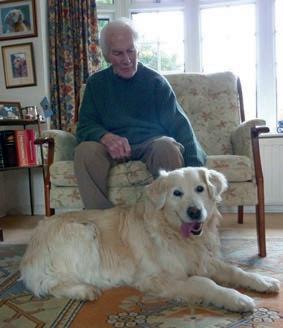
The home costs nearly £3m a year to run, and in the absence of any regular government funding, they are left almost completely dependent on donations and fundraising initiatives to keep going.
One of the most powerful ways that the community has supported the charity is by leaving gifts in their wills. An astounding one in three animals that reside with them each year has had their care funded by legacies.
Legacies and Individual Giving Manager Gillian MacAulay explained: “We simply couldn’t keep going without this lifeline and there really are no words to describe what it means to us when we discover that someone has made that decision to include us in their will.
“This support can transform the lives of the hundreds of vulnerable animals who need our help each year – for as long as they need it. By leaving a gift, your love and compassion for animals can live on.” q
• To find out how to make a lasting contribution, please visit edch.org.uk/legacies or contact Gillian MacAulay, Legacies and Individual Giving Manager on 0131 669 5331 or by emailing gillian@edch.org.uk
[
LEGACIES MEAN SO much to the team at Last Chance Animal Rescue. These wonderful gifts have helped them to rescue, rehabilitate and re-home so many abandoned, abused and unwanted dogs, puppies, cats, kittens, rabbits and guinea pigs who otherwise would have had no future.
The charity understand the wishes of its kind benefactors who have considered them in their Wills. A spokesperson said: “We know they want their generous gift to us to be used directly to save lives, provide the very best of care and to find loving homes.
“Legacies really do provide the gift of life and Last Chance Animal Rescue can now, after much planning and prudent use of funds, offer our life saving services to so many more needy pets. We are delighted to announce we now have a second rescue and rehoming centre in Kent, giving hope and a true last chance to so many.



“Sadly we cannot thank those who have enabled this wonderful achievement but are extremely grateful to all those who are currently considering helping us now and in the future to continue our work.” q
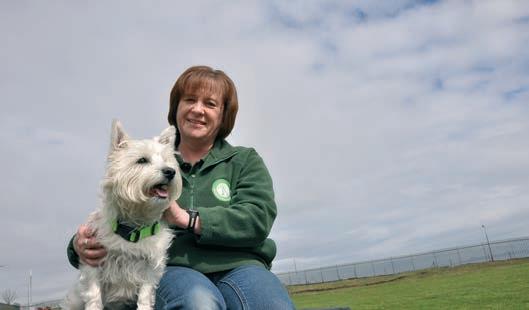

[
THE CHARITY COMMISSION has again warned charities against the risk of online fraud. A survey published in October found that around one in eight charities (12%) had experienced cybercrime in the previous 12 months.
That followed earlier findings indicating that the pandemic prompted increasing numbers of charities to move to digital fundraising and operating, exposing them to the risk of cybercrime.
Most concerningly, the survey highlighted a potential lack of awareness of the risks facing charities online, with just over 24% having a formal policy in place to manage the risk. Similarly, only around half (55%) of charities reported that cyber security was a fairly or very high priority in their organisation.
The warning came ahead of the annual Charity Fraud Awareness Week, which ran from 17-22 October. The campaign raises awareness of fraud and cybercrime and brings the charity sector together to share knowledge, expertise and good practice. It is run by the Charity Commission and the Fraud Advisory Panel, together with a partnership of charities, NGOs, regulators, law enforcers and other not-for-profit stakeholders.
The Charity Commission’s survey explored charities’ experiences of online cyber-attack. It found that over half of charities (51%) held electronic records on their customers, while 37% enabled people to donate online. The most common types of attacks experienced were phishing and impersonation – where others impersonate the
organisation in emails or online. For both attacks personal data is often at risk. The survey also confirmed that there is an under-reporting of incidents when they do occur, with only a third (34%) of affected charities reporting breaches.
Amie McWilliam-Reynolds, assistant director for intelligence and tasking at the Charity Commission, said: “Online financial transactions – and online working generally – present a great opportunity for charities: whether in engaging supporters, raising funds or streamlining their operations.
“This was demonstrated in particular during the pandemic, when the longer-term move away from cash to online fundraising accelerated. But online financial transactions and the collection and storage of personal data also harbour risk, and we are concerned that some charities may be underestimating that risk, and are therefore exposing their charity to potential fraud.
“Preventing and tackling fraud is not a ‘nice to have’. It is vital that every penny given to charity makes a positive difference, especially during these straitened times, when donors, charities, and those they support face mounting financial pressures.”
Sir David Green CB KC of the Fraud Advisory Panel added: “Fraud is the UK’s most commonly experienced crime and much of it is committed online. Therefore, it is essential that charities take the security of their systems, information, people and money seriously.” q
[
THE SUFFOLK PUNCH TRUST is a registered charity, whose aim is to ensure the survival of the famous horse breed. It was founded in 2002 to save the historic Hollesley Bay Colony Stud.

That stud brought a rich legacy of equine and agricultural history which deserves to be saved for future generations to enjoy. The trust aims to achieve that through a successful breeding programme, supported by funding, education and the outreach facility of its visitor centre.
The Suffolk Punch is the oldest English breed of working horse, dating from the 16th century. Every Suffolk horse can be traced back to a stallion, known as Crisp’s Horse of Ufford, foaled in 1768. The Suffolk horse was developed for farm work and gained popularity during the early 20th century. As agriculture became mechanised, however, the numbers fell and the breed almost disappeared completely.
The aim of the trust is to help save the iconic breed from extinction through its established breeding programme. It is working towards increasing the numbers of horses through normal breeding processes and an artificial insemination programme.
It also works to raise public awareness and is training a new generation of professionals to work with and understand the needs of the breed. The Suffolk Punch is incredibly versatile and is now often employed in forestry and ridden work.
The Suffolk Punch Trust can only continue its work with the help of donations and legacies. As David Clarke, one of the trust’s directors, explained: “Your legacy, large or small, will make a huge difference to the work we carry out, enabling us to care for our horses and continue the breeding programme to secure this wonderful breed.” q

[
THE CHARITY COMMISSION is to update its guidance to trustees regarding investment decisions in light of the recent High Court judgment in Butler-Sloss and others v Charity Commission regarding ethical investments.

In a statement the Charity Commission said: “We consider that the judgment offers welcome clarification of how existing legal principles should be interpreted by trustees in a modern context, but that it does not fundamentally alter those principles. We therefore confirm that charities can continue to rely on the legal position in our published guidance Charities and investment matters: a guide for trustees (CC14) when making investment decisions.
“The new judgment confirms that trustees have wide discretion where appropriate to exclude certain investments based on non-financial considerations when making financial investment decisions. These principles are described as ethical investment in our CC14 guidance, and have also been described as responsible investment.”
The judgment also confirms that there is no obligation on trustees to do so, the commission pointed out. They can, where appropriate, make financial investments designed only to secure the best financial return.
Indeed, the judgement by Mr Justice Green said: “Charity trustees’ primary and overarching duty is to further the purposes of the trust. The power to invest must therefore be exercised to further the charitable purposes. That is normally achieved by maximising the financial returns on the investments that are made.”
In its own guidance to accountants, the ICAEW says: “Following the judgement, charity trustees can now place greater reliance on the legal principles which underpin the judgement when they make investment
decisions. This allows charities to consider both the positive and the negative impacts of their investment decisions and will perhaps encourage more trustees to consider the deployment of their financial assets from a more holistic perspective.
“Increasing public awareness of climate action also means that more charity trustees need to consider the reputational impact of their investment decisions if these conflict with the charity’s aims.”
The Charity Commission recognised as long ago as 2020 that ‘practice around investment has evolved, especially in the context of climate change and wider ESG (environmental, social and governance) considerations’.
“In light of this,” the commission said, “we started work on updating our guidance, including conducting a formal consultation. Further work was paused in 2021 because of the commencement of the Butler-Sloss proceedings, which concluded in April this year.”
A wider redesign of CC14 is currently underway. The commission said: “The
redesigned guidance will also incorporate an updated explanation of social investment, which is distinct from financial investment and is currently covered in separate guidance. Furthermore, we will ensure the redesigned guidance is accessible, with straightforward structuring and examples where helpful, and using terminology that is best able to convey trustees’ duties clearly in the current context.
“As we consulted on draft guidance prior to the legal case, we will not undertake a further formal public consultation, however a draft of the new guidance will be shared and tested with users and sector experts so feedback can be incorporated before it is finalised. We expect our final guidance to be published by summer 2023.”
The commission’s statement also contains a detailed explanation of the Mr Justice Green’s judgement. It can be found at www.gov.uk/government/news/update-oninvestment-guidance-following-butlersloss-case. q
[
HYPO HOUNDS provide a viable health care alternative for children and their families by training a Diabetic Alert Dog to detect the subtle changes in the child’s blood sugar levels.

The dogs are trained to alert parents when the child’s sugar levels drop dangerously low or rise too high. This not only impacts on the child but also on the family’s ability to function as a unit, with the registered carer becoming the dog.
Hypo Hounds work is becoming nationally recognised and is literally saving the lives of children – one sniff at a time. q


[THE CHARITY Heartburn Cancer UK was set up by Mimi McCord in 2003, following the tragic death of her husband Michael from oesophageal cancer. Michael died in 2002 at just 47 years old. He had been experiencing heartburn for a number of years and antacids had been a regular item in the family shopping basket each week. It was only when he was struggling to swallow his toast one Saturday morning that Mimi suggested he speak with their doctor. He was referred to a gastroenterologist, sent for an endoscopy and diagnosed with cancer. Michael died at home just nine weeks later.
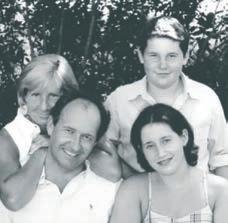
His devastating and untimely death, like many others, may have been prevented if he had known about the dangers of persistent heartburn and its link to oesophageal cancer.
Heartburn Cancer UK are celebrating 20 years as a charity in 2023, with Mimi just as passionate about raising awareness and helping to save lives today as she was 20 years ago.
Around 8,000 people die in the UK every year from oesophageal cancer – that’s 22 deaths every day. It is the seventh biggest cancer killer, with an appalling prognosis of only 15% of patients surviving for five years. It’s also the fourth most common cause of cancer death in males.
Currently, 70% of cases are discovered too late for curative treatment with the most common early symptom being persistent heartburn: Heartburn Cancer UK hopes to be able to change that with the help of its supporters.

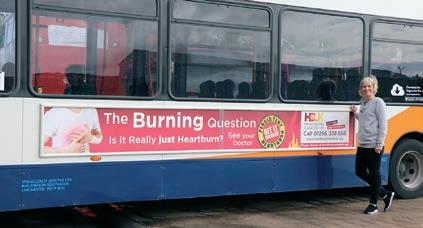

The seemingly harmless symptom is often treated with over-the-counter remedies because people are unaware of the risks. The charity’s mission is to raise public awareness of the dangers of ignoring persistent heartburn and to urge people to seek advice from their GP. If your heartburn is persistent and happens most days for three weeks or more, Heartburn Cancer UK says, you should get it checked.
“The CytospongeTM test is 50% less costly than the current hospitalbased alternative, the endoscopy, and has been shown to identify 10 times as many cases of concern as current primary routine care. It is our aim to help introduce a wider screening service, in a variety of geographical areas, bringing access to this potentially life-saving test to as many people as we can and raising awareness as we go.”
Donations from supporters are more important than ever to help continue their vital work and there are lots of ways people can make a difference.
Said Mimi: “Help us celebrate our 20 years as a charity in 2023 and participate in a challenge – maybe something that’s been on your bucket list for a while – and you can help raise funds for us at the same time. Consider a donation, setting up a regular payment to us or a legacy gift. You could even do something as simple as select us as your charity on Amazon or EasyFundraising and every time you shop you could help support us by just buying something and not spending a penny more.”
No matter how large or small, said Mimi, every penny can help make a difference.
Mimi McCord, Chairman of Heartburn Cancer UKShe added: “After 20 years of seeing no change in earlier diagnosis, the CytospongeTM could really make a difference and we want to continue to support its journey into everyday care in any way we can. Along with vital awareness about not ignoring persistent heartburn problems that trouble you regularly, we are determined to continue making a difference and help save lives.
“If you have persistent heartburn, getting checked by your doctor will help give you peace of mind or put you on the path to a far better prognosis if there is a problem.” q
They also provide information and support to patients and their families living with reflux, Barrett’s oesophagus (a pre-cancerous condition) and oesophageal cancer, and support research to help increase early diagnosis, improve patient outcomes and ultimately help save lives.
Mimi told us: “The key to challenging these appalling stats is early diagnosis. Excitingly, we are currently partnered in a pilot project which introduces an innovative screening test, the CytospongeTM, into primary care: initially in East Anglia, Essex and Suffolk where the project will screen 1,500 at-risk patients with the use of a mobile diagnostic unit supplied by Heartburn Cancer UK.
• For more information about the charity, or how to donate, visit the website at www.heartburncanceruk.org
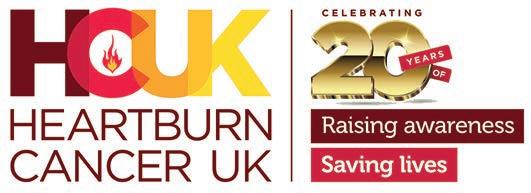
After 20 years of seeing no change in earlier diagnosis, the CytospongeTM could really make a difference…
[
THERE ARE TWO MILLION people in the UK living with sight loss and by 2050 the figure is set to double. Being diagnosed with any form of sight loss is lifechanging and devastating for both the individuals concerned and their families.
The Partially Sighted Society is a national charity that understands this; it has been providing help and support to anybody living with sight loss for over 50 years.
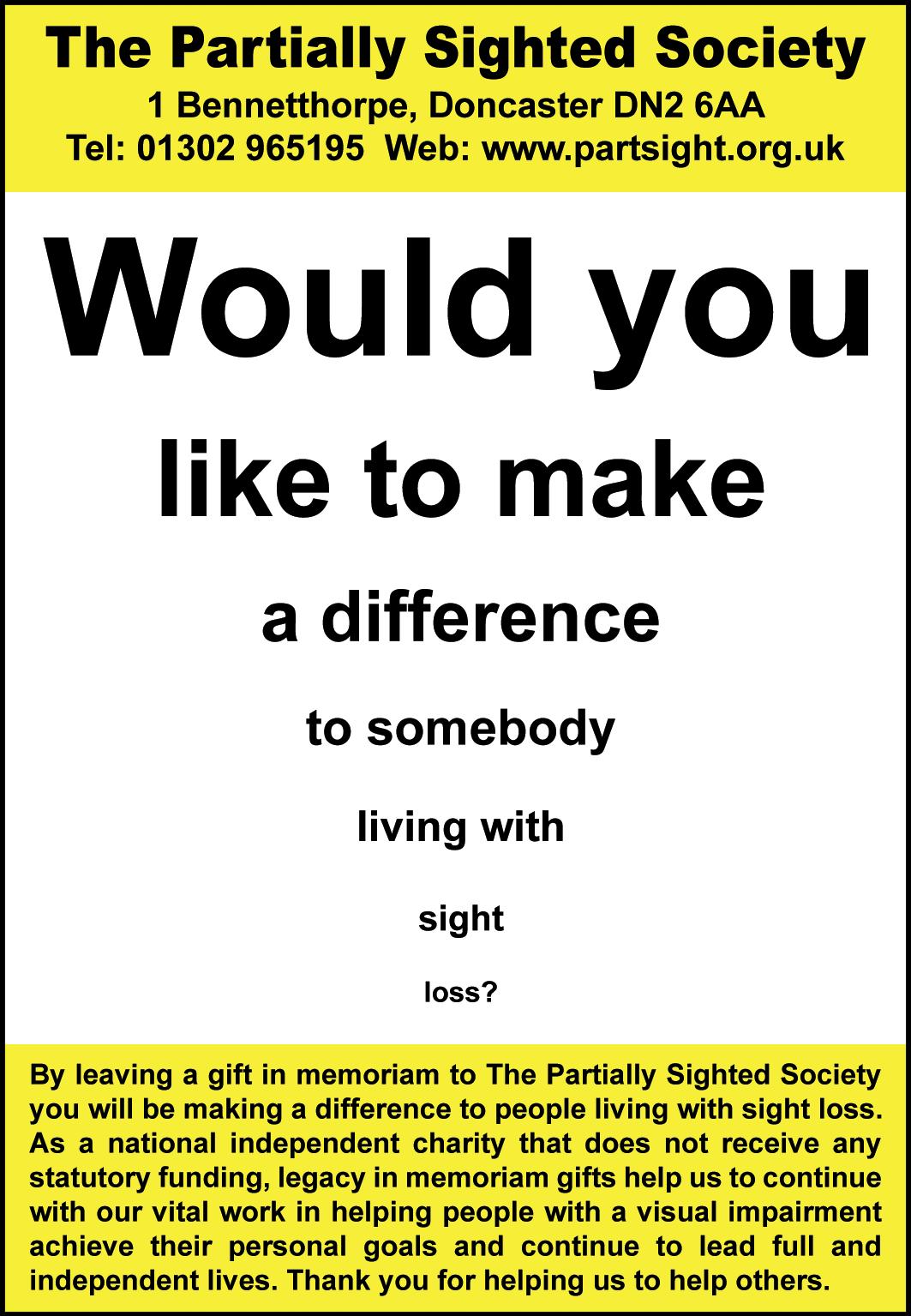

The society’s range of services includes the design, printing and provision of bespoke school exercise books for children, a specialist low-vision and sight test service, and the provision of aids and equipment to assist those living with sight loss to continue to live full and independent lives.
They are there to offer support for both the practical and the emotional impact of sight loss, by phone and in person. They also offer a range of social and support activities to alleviate the social isolation that comes with sight loss.
Leaving a gift in a will is a meaningful way of helping The Partially Sighted Society to help others. Legacies leave a lasting impact on transforming the lives of those living with sight loss. q
[
KIDNEY KIDS SCOTLAND, a very small charity with a huge heart, has for the last 23 years supported Scottish children with renal and urology conditions. The main aim of the charity has always been to enable these children to receive treatment as close to home as possible and minimise disruption to the family unit.
In addition the charity helps hospitals all over Scotland, supplying them with much needed equipment and funding posts recognised as being essential. Chronic Kidney disease is a condition that has no cure and that children and their families must learn to live with.

IMAGINE your child only being able to drink 400mls in one day. That’s less than two cartons of juice – a can of juice is 500mls.
IMAGINE being a parent where you must be home before 8pm every single night to ensure your child gets their daily home dialysis.
IMAGINE not being able to take your family abroad or too far away from the hospital because your child cannot go without their dialysis. This HAS to happen in hospital 3 or 4 times EVERY week.
IMAGINE your child missing out on school education, social activities, family members’ birthday celebrations, a sibling’s sports day or a family wedding because you need to make sure they receive their life saving dialysis treatment.
IMAGINE your child spending their birthday and/or Christmas Day in hospital and not being able to see their friends from week to week. q
IMAGINE LIVING WITH KIDNEY DISEASE
For more information about Kidney Kids Scotland please visit our website at www.kidneykids.org.uk, call 01324 555843 or email office@kidneykids.org.uk Kidney Kids Scotland can help in many ways
[RESEARCH PUBLISHED by the Charities Aid Foundation (CAF) in October revealed how the strain on household budgets continues to affect charity donations – with 4.9m individuals choosing not to make a one-off donation as a direct response to the rising cost of living. Nearly one in ten (9%) said they held back from donating, according to the latest monthly digest from CAF’s UK Giving research, which informs the annual UK Giving Report
Worryingly, more than 3.2m people (6%) also said they reduced or stopped a regular payment to charity because of increasing living costs. That will be of particular concern to the many charities who rely on regular income from direct debits and standing orders.
Meanwhile, nearly one in five (19%) are considering cutting back on their donations, compared to 14% six months previously. In August, the number rose to 22% as household concerns around energy bills peaked.
CAF’s UK Giving tracks household donor behaviour every month and reveals how levels of donations continue to trend downwards. In September, only a quarter (26%) of people said they had donated in the previous month. Prior to the pandemic, around three in ten (30%) usually said they gave to charity in September. The average monthly donation also declined slightly in September, with a mean donation of £51 compared to £67 in August.
Summer has traditionally been a popular time for sponsored sporting events and September saw the build-up to the London Marathon on 2 October. However, only 8% of people sponsored someone for charity in September and 5% in August.
Inflation is also eroding the value of charity donations. Recent analysis by CAF and Pro Bono Economics estimated that a charity donation of £20 started in 2017 will be worth just £14.90 by 2024.

Neil Heslop OBE, chief executive of the Charities Aid Foundation,

commented: “Charities need donations now more than ever, as more families rely on the vital services they provide. Mass giving is crucial for many charities so, as people cut back, government and private sector funding which supported charities through the pandemic is greatly needed to help them through this crisis.
“With more than £500m of Gift Aid unclaimed, which should rightly be with charities delivering frontline services, the process needs to be simplified to deliver desperately needed funds. The government also needs to address the current complexity of the VAT system, since it’s estimated that the sector loses billions paying tax that they cannot recover later.
“Despite falling donations, charities are working hard to help the growing number of families at the sharp end of the cost-of-living squeeze. But ultimately, charities are having to do much more, with much less money.” q

[ANIMAL-FREE CANCER RESEARCH is the ethos of the Caring Cancer Trust (CCT), which funds groundbreaking, ethical, animalfree research into cancer, its non-invasive treatment, cure and prevention.

CCT has its own ‘Stopcancer’ laboratory research programme that does not use live animals or embryonic stem cells. Over the past 20 years CCT-funded oncology researchers have discovered potential new causes of children’s cancer, developed new treatments for early-stage cervical cancer and are now advancing knowledge for the prevention of cancer.
Cancer treatment and cure are obviously good, but cancer prevention is best, since it avoids the stress of the dreaded cancer diagnosis and the debilitating treatments which follow.
CCT believes that one way to prevent cancer is to correct the damage caused by environmental pollution. It is very clear that the world we live in is now polluted with toxic chemicals in the home, in the air we breathe and in the land on which we stand. Indeed, environmental pollution from industrial farming has produced drastic changes in the microbes found in the soil in which our food is grown. That results in loss of microbial diversity, which produces ‘sick soil’.
they provide financial support for adult cancer sufferers to ameliorate their sickness, improve their quality of life, limit their stress and, where possible, help their recovery.
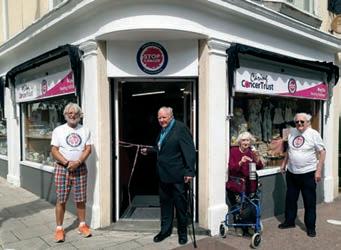
A cancer-free future
CCT-funded research aims to increase understanding of how silent infections, lifestyle, diet, genetic predisposition and environmental pollution lead to different types of cancer in children and adults. Indeed they have identified simple changes in lifestyle and diet which, combined with avoidance of exposure to environmental contaminants, will reduce the incidence of cancer in all age groups.
Caring Cancer Trust’s Stopcancer programme is entirely managed and run by unpaid volunteers and financed by legacies and donations. A gift to them funds animalfree research into cancer treatment and prevention as well as Youth2Go creative adventure holidays for children recovering from cancer.
In short, they aim to create a cancer-free tomorrow for the children of today. q
The types of microbes found in our gut come from the soil and they are essential for our health and wellbeing. It is very simple: sick soil produces sick humans, sick animals and plants, and correcting that should reduce the incidence of cancer. Our polluted world actively encourages cancer and CCT funds an integrated approach to cancer research which aims to identify cancer risk factors in our lifestyle, and the environment we live in.
CCT also provides special ‘Youth2Go’ Healing Holidays of creative adventure for children recovering from cancer, enabling them to regain their self-confidence and reignite their passion for life after the trauma of their illness and lengthy treatment. In addition,
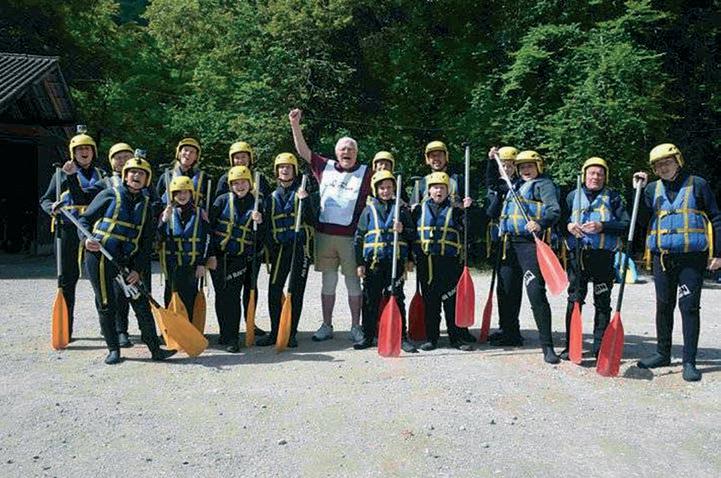
The CCT aims to identify and understand hitherto-unknown cause-and-effect relationships to either limit exposure to such carcinogenic factors or devise therapies which suppress their effects before a cancer has developed.
The CCT research mission for cancer prevention involves:
• New lifesaving cancer prevention
• medicines
• New therapies for cancers in their early
• stages
• Analysis of the role of microbes in
• causing cancer
• New therapies for later-life cancers

• Heightened cancer awareness by GPs
• and public
• Lifestyle, diet and environmental
• changes for cancer avoidance
• Dissemination of trial results relating to
• cancer treatment and prevention
[INTRODUCING chimpanzee brothers Fergus and Twmi – they are the reason Wales Ape & Monkey Sanctuary began back in 1998.





Even though they are brothers, their personalities are quite different!
Fergus (36) is very mischievous and loves the camera – and apart from hoarding bananas and eating onions, winding the other chimps up, he loves to be in every single photo you try to take.
Twmi (38) is more cool, calm and collected. He likes to oversee and watch what the other chimps are getting up to but also makes his presence known if needed. He loves head bopping to Queen – his favourite band –
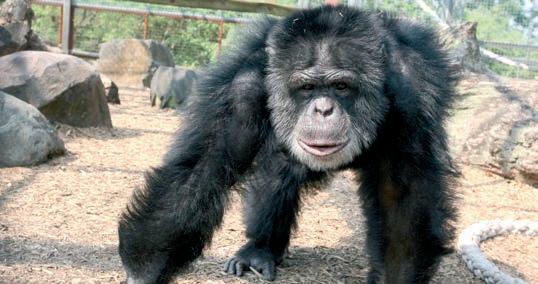
and loves his food. Iceberg lettuce and grapes are a firm favourite.
Fergus and Twmi have a great relationship with Nakima, Bili and Ronnie, the other chimps they live with. You will see them on sunny days relaxing in their hammocks and grooming each other.
The brothers are both very popular amongst visitors. Children often get smiles from Fergus which makes their day! q
• For more info call 01639 730276, email info@ape-monkey-rescue.org.uk or visit the website at www.ape-monkey-rescue.org.uk

[
TO CELEBRATE the best examples of trusteeship in charities, the Clothworkers’ Company – one of the oldest-established of the London Livery Companies – organises the Charity Governance Awards. The awards are an exciting initiative that allow large and small notfor-profit organisations to inspire and learn from one another. They are the only charity awards designed to celebrate trustees, are free to enter – with a free awards ceremony – and do not generate profit for the sponsors or partners.
Now in their eighth year, the Charity Governance Awards will recognise inspirational success stories of bold trustee leadership, with a new category aiming to understand how bold and ambitious trustee leadership is generating meaningful change and addressing systemic problems affecting the third sector and society at large, such as the climate emergency, cost of living crisis, poverty, racism and more.
Recurring categories focus on small charities that have improved impact during the difficult past few years, as well as boards of trustees that have made long-term improvements by embracing and transforming with digital. An on-going area of focus for the awards is equity, diversity and inclusion in charity governance – never

more needed as trustees and charities strive to understand and support their communities during hardship, crisis and systemic challenges.
Boards demonstrating outstanding governance and trusteeship are urged to share their own examples of best practice. National and local charities, large and small, are encouraged to participate.
Entry is free and the deadline is 8 February. The shortlist will be announced in April and in June shortlisted charities will be invited to a complimentary awards ceremony in central London, where the winners will be revealed.
The winner of each of the five categories will receive a £5,000 unrestricted grant for its charity as a prize. Runners-up will receive cash prizes of £1,000 each and each shortlisted charity will be offered a paid one-year membership to the Association of Chairs for its chair or vice-chair, as well as a complimentary place on a Cause4 Trustee Leadership Programme for a new or inexperienced trustee.
The awards are organised in partnership with New Philanthropy Capital (NPC), ProspectUS and Reach Volunteering.
• For details on how to apply visit www.charitygovernanceawards.co.uk
[
THE HORSE RESCUE FUND was founded at a time when many deliveries were still being carried out using horses – which at that time were destined for a bleak fate after they finished their working life.
That history explains why, as well as rescuing horses, ponies and donkeys in desperate need, the fund has campaigned for improvements at horse sales, in transit and for equine welfare generally. Indeed, they often work in conjunction with their fellow organisations on some of the largest equine welfare cases.
The charity’s byline is: Rescue, Rehabilitate, Rehome
A spokesperson for the charity commented: “All of our rescued horses are treated as individuals and – being one of the smaller welfare charities – our staff get to know the likes, dislikes and foibles of each horse in our care, so their treatment can be personally tailored to their needs.”
After rehabilitation and when they are fit, their animals are placed on loan in private adoptive homes to lead happy, useful lives. Some have gone on to win at prestigious shows, and even appeared on television!
They continued: “We never sell them, so we are able to ensure their wellbeing for the rest of their lives; and if their loaners’ circumstances change, they can always be returned to us. Horses do so much for humans – we try to repay some of that debt; they cannot speak, but we can.”
Funds are urgently needed to continue that work: legacies, covenants, individual donations or corporate funding are all most welcome. Members receive a biannual newsletter keeping them up to date with all the happenings on the yard at Woodstock Farm in Norfolk.
For more information visit the website at www.horserescuefund.org.uk or email info@horserescuefund.org.uk q

[
MAYBE YOU LOVE ANIMALS: maybe you have given a loving home to dogs or cats in need. Perhaps the suffering of animals through neglect, abuse or abandonment causes you pain. If you would like to help create a world that is kinder to all creatures, remembering Paws2Rescue in your will means you will help to alleviate the suffering of animals for years to come.
The mission Of Paws2Rescue is simple: to help animals in need wherever they are. As they are entirely staffed by volunteers, every penny they raise enables them to fulfil that mission over and over again.

Paws2Rescue’s Alison Standbridge explained: “Although we are a UK- based charity, we recognise that too many animals overseas suffer appalling neglect and cruelty. That’s why, as well as finding loving UK homes for unwanted dogs and cats, we undertake a variety of international projects to reduce the suffering of animals, with a particular focus on Romania and Moldova –countries where animals continue to suffer the most distressing abuses.
“We aim to alleviate the day-to-day misery of these unfortunate animals by meeting their basic needs – food, medical treatment and sanctuary – and by supporting shelters in rural areas where resources are desperately needed.”
But the key to truly ending the misery is to tackle its root causes. Therefore, Paws2Rescue also provide free neutering services for both stray and owned animals, encouraging owners to take responsibility for their pets’ health by preventing unwanted litters of kittens and puppies. Their Veterinary Scholarship Programme funds young people through their university studies to encourage more local vets to work in rural areas in Romania where the need is greatest.
Alison continued: “Education is crucial to our mission: if future generations are brought up to hold the same antiquated, cruel attitudes towards animals as many of their elders, then the horrible abuses will continue. To break this negative cycle, our successful schools
“So, although our current aim may be to help animals in need wherever they are, our dream is to create a world where no more animals need our help.
“By leaving a legacy to Paws2Rescue, no matter how small, you can rest assured every penny of your kind donation will be helping dogs, cats and other animals in desperate circumstances both now and in the future. Thank you.” q

[
RESEARCH from Blackbaud’s Status of UK Fundraising Report 2022 shows that 79% of non-profit organisations in the UK are concerned about the economic situation leading to fewer donations in the next 12-18 months.
Now in its fifth year, the Status of UK Fundraising Report offers a comprehensive view of where fundraising stands in the year. This year the survey was carried out over three weeks in June.
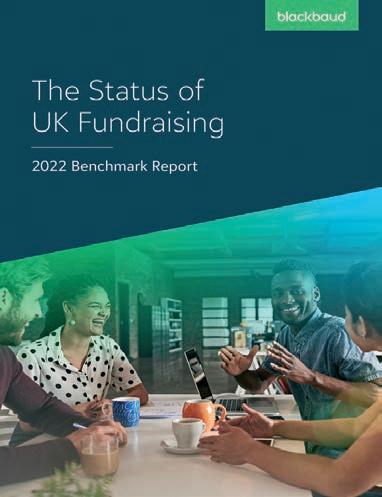
Over 1,000 professionals in the charity sector responded to questions covering such topics as income trends and fundraising targets, digital transformation and collaboration. A number of in-person interviews were also carried out with fundraising professionals.
In his foreword, Blackbaud’s executive vice-president David Benjamin commented: “Resilience is a word that has seemingly increased in use over the last few years, illustrating the capacity of the sector to recover quickly from challenges. Such resilience not only acts as a risk management strategy but also as fuel for
innovation and growth.
“This year in the United Kingdom, reported levels of optimism are dipping. Non-profit fundraisers are tired from the years of unprecedented headwinds amidst the unwavering commitment to support their missions. With pressure on income, it is even more critical to evaluate long-term plans and ensure alignment of investments to those goals.”
In light of those findings, Blackbaud has published a digest of seven practical steps charities can take to build resilience and futureproof their organisation:
• Embrace digital transformation
• Find and target major donors
• Focus on donor retention
• Invest in a sustained giving programme
• Add to your donor pool
• Harness the power of peer-to-peer
• fundraising
• Diversify your revenue mix
Blackbaud is the world’s leading cloud software company ‘powering social good’. It offers purpose-built solutions for fundraising and relationship management, peer-to-peer
[ THE BRITISH CHELONIA GROUP publishes six newsletters a year containing details of meetings, short articles, news items and veterinary notes. Their journal Testudo is published annually and contains original articles and reviews on all aspects of turtles, terrapins and tortoises – their biology, conservation, welfare, veterinary care and husbandry. The group also organises symposia.
As well as the yearly appeals in aid of specific international causes in chelonia research and survival, the BCG assists other worthy causes in support of its aims with grants. They invite grant applications from organisations and individuals engaged on the work of chelonia conservation – such as zoos, universities, zoologists and students in this country and overseas. q
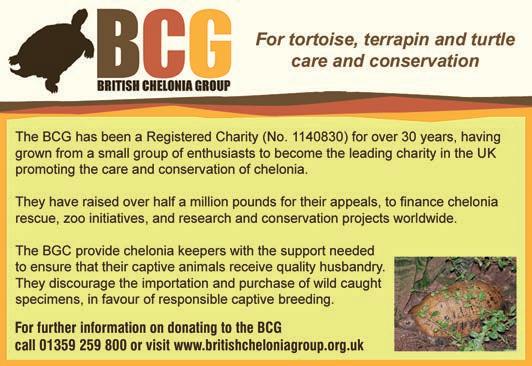
fundraising, corporate social responsibility and environmental, social and governance programmes, education management, ticketing, grantmaking, financial management, payment processing and analytics. q



[
IT WOULD BE TEMPTING to try to explain all that is The Fox Project, but that would look a little like a shopping list: wildlife information bureau, humane fox deterrence consultancy, wildlife ambulance service, wildlife hospital etc.
Instead, it would be more straightforward to concentrate on what’s going on right now, as we are nearing the end of the annual cub season, with almost 300 fox cubs having come into our care. How does that work?
Wynn was one of the first cubs the project received in 2021. He is pictured gazing thoughtfully out of his pen at the setting sun, perhaps quietly wondering how he can get out into the big, wide world and do what he wants, rather than what we want.
Founder of The Fox Project Trevor Williams takes up the story: “Wynn was picked up next to a dead sibling by a passing dog walker and we assumed they had crawled out of the den in search of a mother that, for whatever reason, had failed to return. He was a keen bottle feeder, and because baby animals need the company and warmth of others, he was grouped with Wendell, Wilfred, Calvin and Bertie.
“Cubs grow fast and a brooder will only hold them for so long before their accommodation needs to be upgraded to steel vet cages. And they, too, are soon inadequate for curious, active youngsters who are developing speed and agility – albeit wobbly speed and agility!
“The next step was day release in a two-storey chicken run and back in the warm at night for a bedtime bottle and a bowl of dog food. They loved that! And then they were moved to a larger foster pen, where muscles could develop and they could feel the weather. “As soon as Wynn and Co were weaned off the bottle, the bond with their feeder was broken and they were transferred to one of our team of fosterers. These volunteers have pens in their gardens where they can look after the needs of a litter of cubs without getting directly involved with them.
“And that is where the serious work begins in encouraging cubs to revert to wild in preparation for late summer release. Given all the changes, our cubs should be growing suspicious of people in general; and their first instinct when a fosterer approaches is to run into the hutch provided. If they begin to get ‘waggy’ with the fosterer, we move them to another. And we keep doing that right through the summer.
“From mid-June, we start to move them onto pre-arranged rehab sites – no more than five cubs per site. Those are predominantly rural: often farms and smallholdings.”
The cubs are now the responsibility of the rehabber that owns the property. Their job is to feed, water and clean out the pen and never to speak. A cautious cub is a cub that will live the longest: if you’ve made a cub tame, you’ve undermined their potential for a safe and long life.
After four to six weeks on site the cubs are used to the sights, sounds and smells of every other animal in the area and vice versa. That means they can safely be released without danger of attack. Come the night of release, the rehabber simply leaves the door open and walks away.
Trevor continued: “Timing for this final part of the procedure is governed by nature. Just as the breeding season fluctuates a little every year, so does natural dispersal, when wild-raised cubs – by now around five months old – will fan out from their home territory to locate their own: a vital process to avoid in-breeding and necessary if they’re ultimately to find a mate. Release of our cubs is timed to coincide with that point.”
Wynn and his chums were released from a smallholding in East Sussex. Initially, they all returned for support feeding, but it’s seldom needed for long. As they begin to use the instincts nature provided them with, the cubs return less and less frequently.
“When they no longer return,” said Trevor, “we must hope they’re doing well. And we generally know they are, because we often see them around for months, or even years. Not that it’s any of our business. We’ve given them that all-important second chance and whatever befalls them, good or bad, is down to them.” q
[ IN 2019, following the retirement of managing trustee Colin Cooper, some of the Heartbeat horses moved to a new home at Sink Farm in Woodbridge, Suffolk.
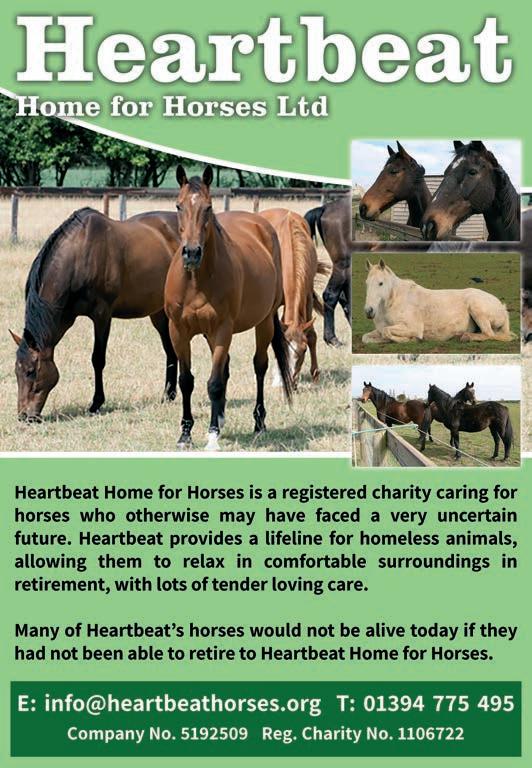
Colin was very pleased to announce that the charity’s headquarters had moved to Hollesley where the current horses will live and be cared for alongside the wonderful Suffolk Punch horses.
Sink Farm is the colony stud for the Suffolk Punch Trust charity, who continue their important and essential work in preserving this unique breed. q

• For more information on either charity please contact Tracey Pettitt, stud manager or David Clarke, finance director, on 01394 775495.
Heartbeat Homes for Horses, Sink Farm, St David’s Lane, Hollesley, Woodbridge, Suffolk IP12 3JR
[ANIMAL CHARITY Wild Futures rescues and offers sanctuary to monkeys who have suffered abuse and neglect. They are dedicated to protecting primates and their habitats worldwide – primates are endangered due to climate change, habitat destruction and the bush-meat and pet trades.

For some species, it is too late. The future of all that remains lies in our hands, so leaving a legacy to Wild Futures is the gift of life and a future for primates and our wonderful planet.
Wild Futures’ holistic approach makes them unique – providing sanctuary to rescued
monkeys, supporting projects overseas, campaigning for primate welfare, educating to protect primates worldwide and promoting a sustainability and ethical ethos.
They receive no government funding, so the generosity of those that remember Wild Futures is essential to enable them to continue their work. A legacy can be the gift of a life worth living and a wild and safe future for all. q
• For more information call 01503 262532, email giving@wildfutures.org or visit the webiste at www.wildfutures.org

[
IN SEPTEMBER the Fundraising Regulator published its first Strategic Plan as an established regulatory body, covering the period 2022-27.

Launching the report, the regulator said: “With this new fiveyear Strategic Plan, we intend to move into the next phase of our development, while ensuring that we continue to respond appropriately and flexibly to changes in the charitable fundraising sector.”
Developed following engagement with charity networks and other stakeholders, the strategy sets out the regulatory objectives and priorities for the period 2022-27 and addresses the new trends in charitable fundraising which have emerged since the regulator was established in 2016. That includes the increasing popularity of new technologies, the growing use of data and the on-going impact of the COVID-19 pandemic.
The first phase of the plan includes a full review of the Code of Fundraising Practice – which started this autumn with a public call for information that closed on 25 November – to ensure that the code remains effective, relevant and responsive to new issues in fundraising.

It will be the first significant overhaul of the code since the last consultation in 2018, which led to the current version that has been effective from October 2019.
Over the next five years the regulator also plans:
• To conduct detailed research into the public’s experiences with and
• expectations of charitable fundraising
• To collect data about fundraising from external and internal sources
• to help develop the code and inform regulatory priorities
• To continue to deliver joined-up regulation through partnerships and
• relationships with other organisations.
It will also be carrying out a review of the Fundraising Levy and how it is calculated.
Lord Toby Harris, chair of the Fundraising Regulator, commented: “We have seen considerable changes in the fundraising landscape since we were established and anticipate that methods will continue to shift and develop over the next five years, too – shaped by wider social, economic and technological changes.
“This strategic plan reflects our on-going commitment to evolve as an agile regulator alongside the sector – ensuring our regulation protects donors and the public, while also supporting a vibrant and creative fundraising sector. At the core of our plan are the principles of innovation, proactivity, intelligence and collaboration.”
The Strategic Plan is part of the Fundraising Regulator’s continued commitment to provide a transparent view of how it will deliver effective regulation of charitable fundraising. q
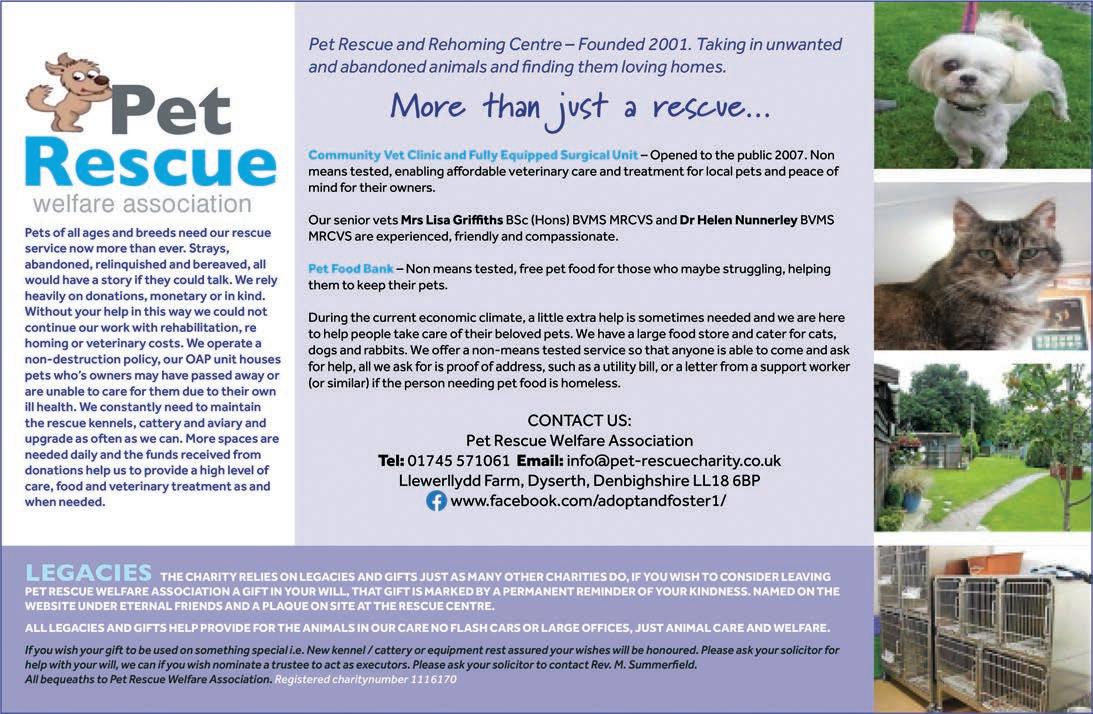
[
A THIRD OF BRITONS have said they have adjusted their Christmas shopping plans by shopping with charity retailers –many as a result of the rising cost of living.
That’s according to a survey of 2,010 people conducted by Censuswide for the British Heart Foundation (BHF). That figure rose to 46% of respondents aged 16-24. Second-hand books (26%), toys (20%) and clothes (17%) were among the top of the list of gifts that they will buy.
As many said they were motivated to buy their Christmas presents from charity retailers to help fund a good cause (37%) as to save money (34%). Other motivations were to find unexpected treasures (22%) and to be more sustainable and environmentally friendly (21%).
Allison Swaine-Hughes, BHF’s retail director, commented: “We know this festive season is going to be tougher for many families across the UK – and this survey shows that due to the rising cost of living, the need to make our money go further is even greater.
“By shopping with the BHF, you’ll also be giving the gift that keeps

on living, by helping to fund our lifesaving research. You’ll find affordable treasures for your loved ones and it’s a great sustainable solution, too.”
The results of the survey confirmed the message of the Charity Retail Association as it launched its annual #GoodCauseSantaClaus campaign to encourage festive shoppers to purchase from charity shops and to help spread the word about the wonders of pre-loved.
The association said: “The popularity of second-hand is booming as people embrace the fun of finding pre-loved treasures and the satisfaction of benefiting a charity and the environment. Buying from charity shops reduces the volume of new items that need to be produced and shipped around the world as well as minimising waste by giving items a second – maybe even a third – life.”
The association produces a range of downloads for charities to push the message of buying from their shops at www.charityretail. org.uk/good-cause-santa-claus-2022 q
[
OVER THE LAST FEW MONTHS Hope Rescue in South Wales have consistently faced extraordinarily high vet bills due to the number of very poorly dogs entering their care, many of which require ongoing investigations, treatments and surgeries.
Unfortunately, this is a pattern likely to continue and the charity’s outgoings are set to rise due to the constant influx of abandoned and stray dogs coming through their doors – as well as trying their hardest to help owners who can no longer care for their dogs. Not to mention the increasingly high numbers of dogs seized from illegal and low welfare breeders.
Hope’s initial fundraising appeals often only cover a fraction of the total costs incurred in nursing dogs through
to recovery. Ensuring each individual dog gets the very best vet treatment – which is often not the cheapest option – will always remain a priority for the team at Hope.

Supporting this charity through promoting gifts in wills will help them to plan and will be
the reason they can continue to say ‘yes’ to vulnerable dogs and their owners. q
• Find out more about Hope Rescue at www.hoperescue.org.uk or get in touch enquiries@hoperescue.org.uk

The range of charities which depend on legacies to carry out their valuable work is a broad one. Those that are represented in this publication are listed below, grouped according to the area of activity in which they operate.

Friends of the Animals 4/5
Oak Tree Animals’ Charity 8
The Devon Horse and Pony Sanctuary 8
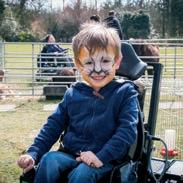
Three Counties Dog Rescue 9
The Suffolk Owl Sanctuary 12
The Pit Pony Sanctuary 12
Hessilhead Wildlife Rescue 13

Environmental Investigation Agency 22
Tiggywinkles 24
Catholic Concern for Animals 24
The New European Distressed Donkey Initiative Ltd 25

Humane Slaughter Association 26
Universities Federation for Animal Welfare 27
Edinburgh Dog and Cat Home 28
Last Chance Animal Rescue 28
The Suffolk Punch Trust 29
Wales Ape & Monkey Sanctuary 38
The Horse Rescue Fund 39
Paws2Rescue 40
British Chelonia Group 41
Shire Horse Society 41
The Fox Project 42/43
Heartbeat Home for Horses 44
Wild Futures 44
Pet Rescue Welfare Association 45
Hope Rescue 46
British Ecological Society 10/11
Prostate Cancer Research 1

Cancer Prevention Research Trust 2
CLEFT 14
Royal College of Surgeons of England 15
The National Brain Appeal 16/17
MS Society 20/21
Heratburn Cancer UK 32/33
Pain Relief Foundation 35
Caring Cancer Trust 36/37
FRAME 48
Parenting
Blood
National Federation of the Blind of the United Kingdom 19 Dementia Forward 30
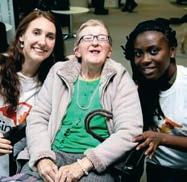
ZANE:

